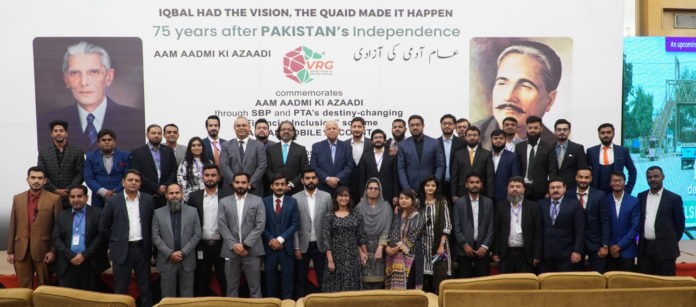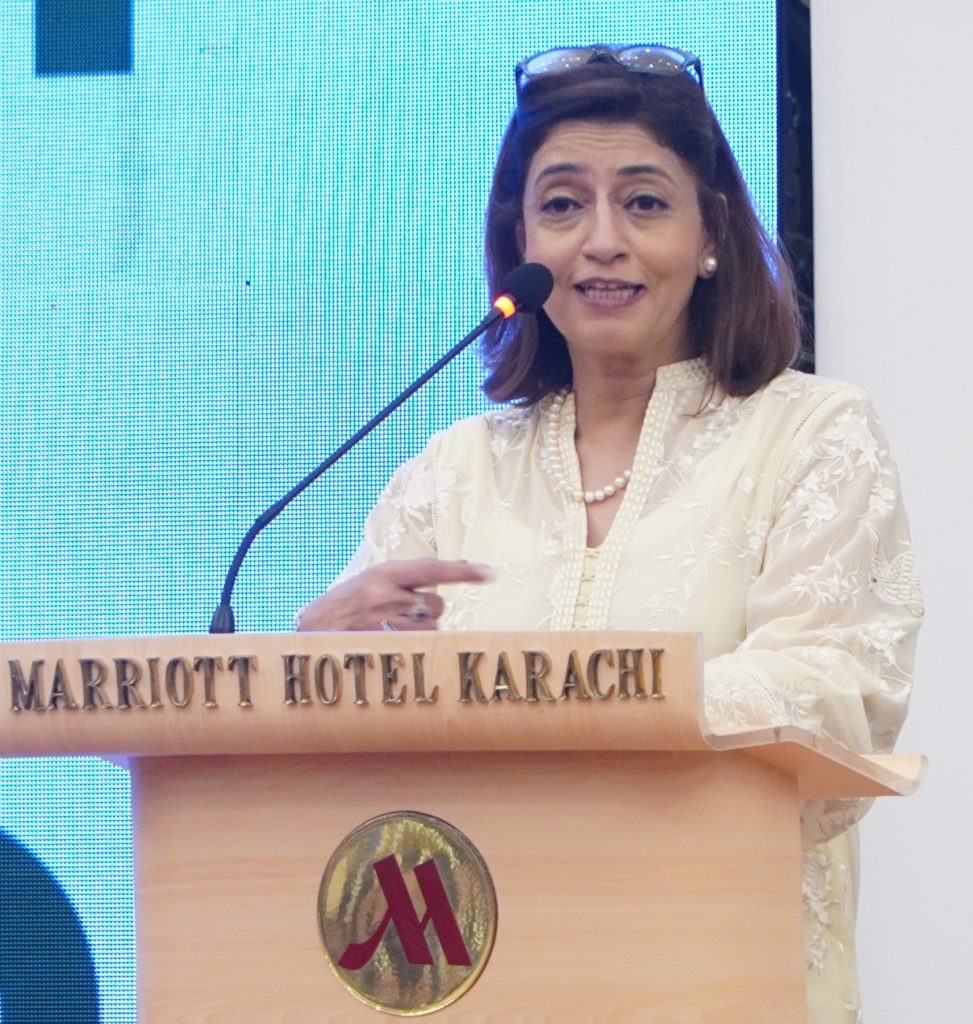
Dr. Huma Baqai, Rector MITE & Moderator: Bismillah-ir-Rahman-ir-Rahim. Good afternoon, Assalam-o-Alaikum and it is absolutely heartening to see a houseful on a Sunday afternoon, which is probably indicative of your commitment to this very critical, important initiative. When I walked into the hotel this morning, there was this lady standing there, and I asked her where is Ikram Sehgal sb’s event held? She looked at me, she had no clue who Ikram Sehgal sb was, but she said Aam Aadmi Wala? And I said yes, that Aam Aadmi Wala, and I think that is the buzzword. That’s what it’s become, and then of course I’m very small observer of it in the sense that I was in Davos, where it was formally introduced and launched to the financial gurus of our country, and all of them had endorsed it, and some of us had very critical questions. So, in that meeting, another thing that became very interesting was that the critical questions will be asked in Urdu, so that is something that has stayed with me.
So we asked a lot of critical questions, worked on it, improved on it and here it is where you’re seeing the commercials on the television. Why is it so critical? It is critical because 80% population of Pakistan is out of the banking circuit, and that is something that must be addressed. We are a nation of talkers, so we started talking about this way back; we started talking about this in the 1990s. Pakistan is one of the first countries which talked about microfinance banking, in fact also introduced branchless banking pretty early, but just taking it to the doorstep of the Aam Aadmi is something that has finally happened, after a lot of red-tapism, bureaucratic hurdles, the legality of it, all of that. But finally, we’ve been able to do it, and I think this is a proud day because Ikram Sehgal sb and his family has worked tirelessly for it, invested in it and today it has happened. I would want to start this event by giving them a hand. Also, a confession that I am not a financial person, I’m an IR person. I don’t even know how my own bank account works, but I was very impressed with all of that it would do, because you see we talk about a lot of things. We’ve been talking about documentation of economy, we’ve been talking about financial inclusivity, we’ve been talking about good monetary governance, all of these need steps to be taken on the ground, just talking about it and then they becoming your buzzwords in your conversations that you have with international organizations is not going to take us anywhere. So, there was this huge vacuum that existed between what we were saying, what we were trying to do and what was not actually happening. So I think this is a critical step in which the fact remains that this is going to go to the Aam Aadmi, Aam Aadmi ka Wallet, Aam Aadmi ka Bank Account, five small steps, and you have a bank account. All this is there, but with that, there are so many other things. What we have been screaming for, that the economy should be documented and it does not happen. This will make it happen and make it happen very quickly. So, it was about bringing together entities that were working in silos, and create this very critical triangular nexus to make it happen, and I think that is what we are celebrating today. I’ll have more things to say, but there are other people who know more about it, by the way I wrote something about it today in Bol News, it’s come out and it is a layman’s view of what it is. But despite that I have received a lot of inquiries and people calling, so I think this is creating a buzz and we need to carry it forward, and all of you here are the multipliers for this buzz. With that, I’d like to invite Zarrar Sehgal sb, Co-Chairman of Pathfinder Group and the VRG and he will have more important things to say about it. So Zarrar it’s over to you.
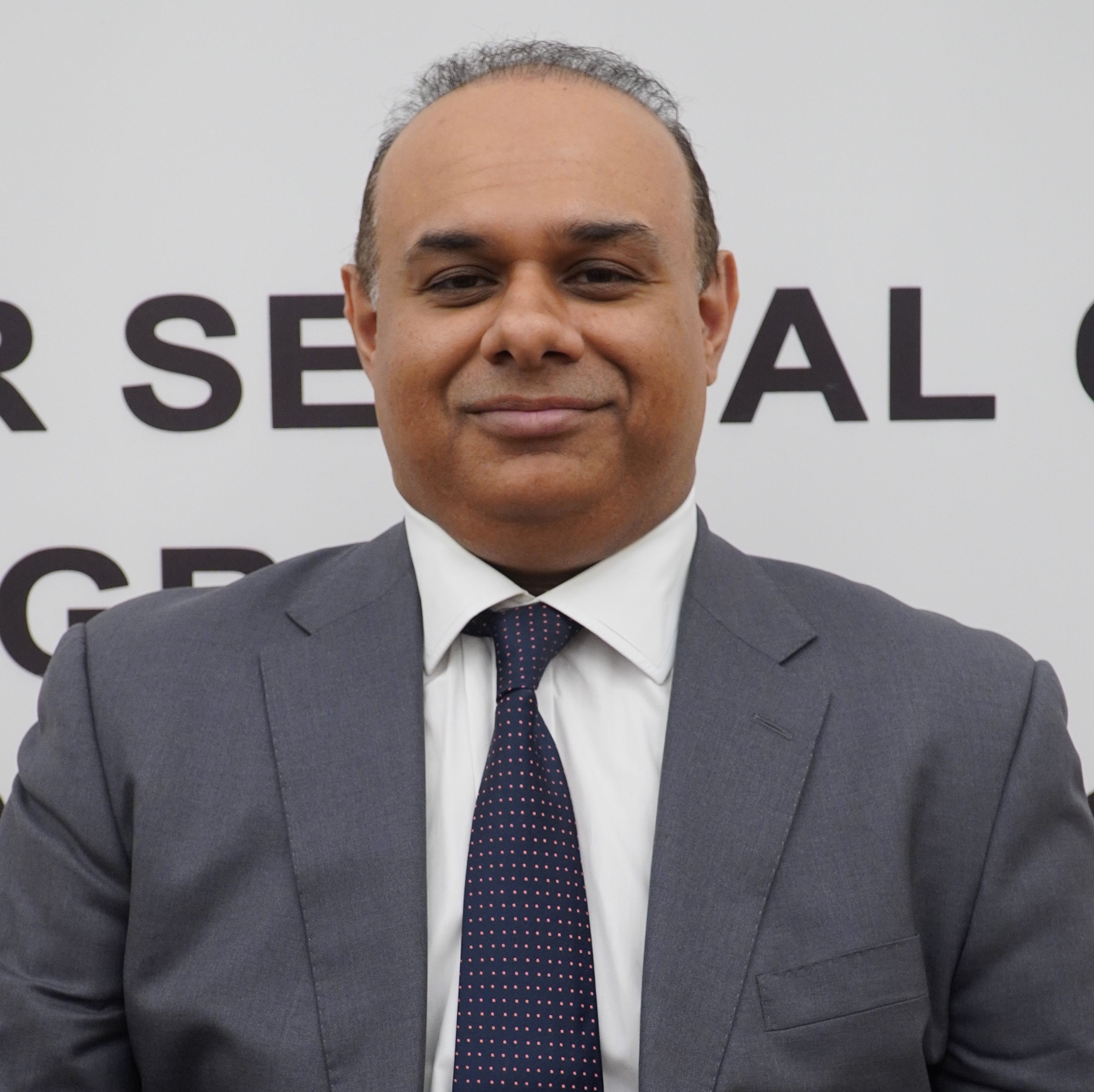
Zarrar Sehgal, Co-Chairman Pathfinder Group and VRG: Thank you very much, Dr. Baqai for the introduction. I’d like to extend a very warm welcome on behalf of VRG, the Pathfinder Group and the Sehgal family. I’d like to obviously commend our chief guests over here. Thank you very much for joining us on this auspicious occasion and thank you for all the guests for coming. I share Dr. Baqai’s view for you to commit on a Sunday, which is a family day, a personal day, for everybody to come here and spend your time with us. We mean it from the bottom of our hearts, it’s truly heartening to see, and what a moment, not just for our organization but really for the whole country, when you think about it.
We talk about democratic freedom, we talk about the right to vote, but I can tell you those rights are meaningless without financial freedom. If the person voting is beholden financially to somebody else, it’s not a real democracy. You’re really talking about people who are beholden to other people and vote a certain way. The Asaan Mobile Account is the first step towards financial freedom for the people of Pakistan. An unbanked population, which exceeds 80%, majority of that are women, which means they’re not in the financial net of Pakistan. Thanks to the effort of the State Bank of Pakistan, the PTA. There are many initiatives in place now to push this unbanked part of Pakistan into the banking system. It’s not just a Pakistani problem, just to take a step back, the UN estimates that there are about 3 billion people in the world that are not part of the financial net because either lack of documentation, either because the banking technology is not there, and documentation problems. But what people do have is a mobile device, more than 80%, 85% of Pakistanis have a mobile device now, and that is where the genesis of this idea was born, from our family, from VRG, from the Pathfinder Group, we thought let’s use this instrument to give the Aam Aadmi their Azaadi, their financial freedom and that’s where VRG first started and it has led to the Asaan Mobile Account. You can see the numbers up there, they keep flashing. Just last night, and we opened up 200,000 accounts in one night. So you can see the penetration, the advertising campaign and I do want to thank the State Bank in particular, and obviously special thanks to Dr. Sima Kamil. I want to thank the whole State Bank team, including Reza Baqir, who was there previously, and is there today, for their support in this program. Because it’s not easy, there are a lot of fintechs in Pakistan and I wish them well, but to have an entity that is regulated both by the State Bank and the PTA, you can just imagine what it takes to work that entity, to run that entity and for that entity to succeed now, but we are here now. Some would call it the beginning; for my family, it’s been a long and tough journey at times with a lot of doubts. I think the one man who’s sitting on the stage, Ikram Sehgal had no doubts, never in doubt. There was this famous saying “sometimes wrong, but never in doubt,” I think that could equally apply to my father as well, and that lack of doubt and actually his vision has led to us being over here. So with that, again, I thank you, I am very grateful for all your support over here. Thank you very much, and I turn it over to the next speaker. Thank you.
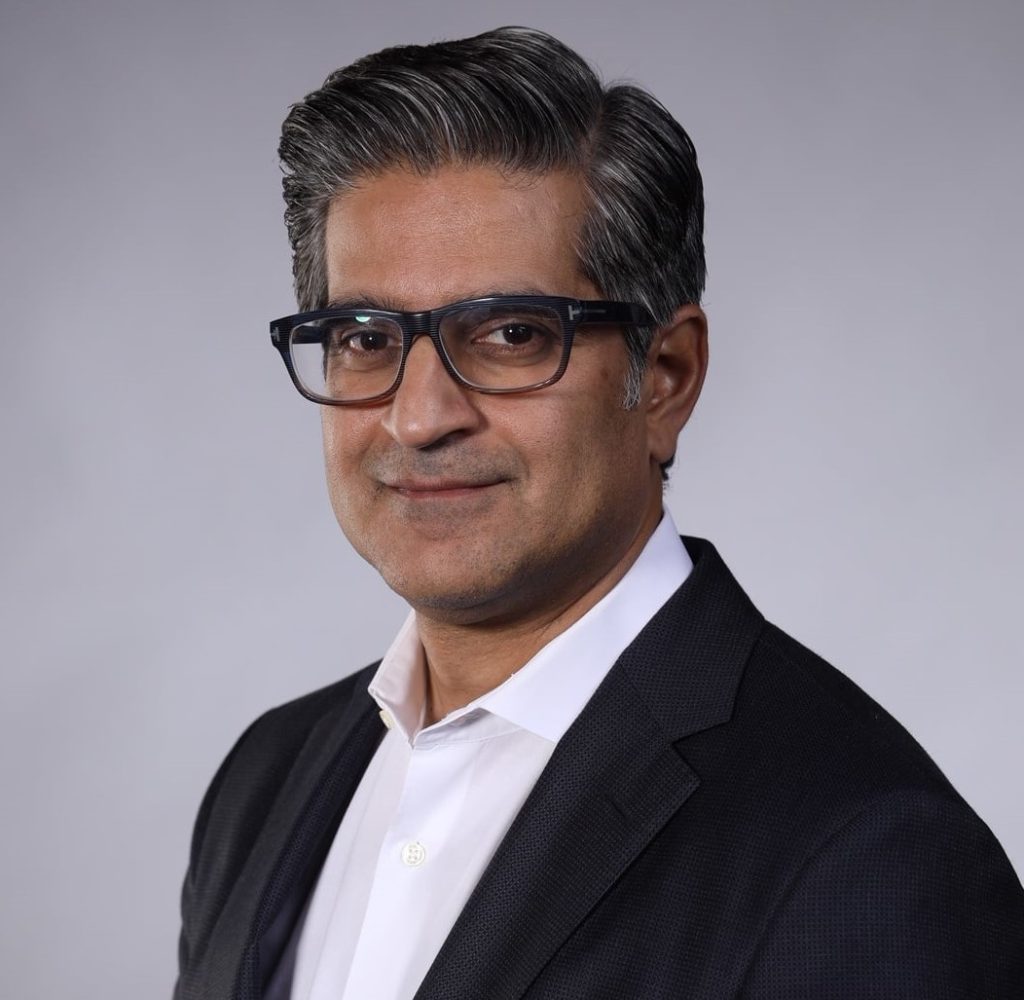
Amir Ibrahim, CEO Jazz: Assalam-o-Alaikum. First of all Happy Independence Day to all of you. Today, the function we are celebrating here is the launch of AMA account, and now I’m being told they have about 4.2 million account holders also. It is a great thing that there are people like Ikram Sehgal in Pakistan, who think about common people. Despite all the progress we have made in many areas, financial inclusion is an area in which we are still lagging behind so far, and despite the fact that JazzCash could be a perceived competitor for AMA, when Ikram Sehgal reached out to me, I said, I don’t care about competition because it’s our common goal to provide financial product facilities to every Pakistani. I am delighted that we have partnered with them. Ikram sb is a great guy, Pathfinder Group has been making contributions in Pakistan for a very long time, and now with VRG, we are very hopeful that this AMA account will see bigger and bigger successes in days to come.
Dr. Huma Baqai, Rector MITE & Moderator: Aam Aadmi ki Azaadi is a good thing, we all try and strive for it, but everyone says that the real freedom and independence is connected with economic freedom and economic independence. The economic woes of Pakistan today are probably also related to our economic problems. So there was a Google commissioned report titled Unlocking Pakistan’s Digital Potential, which says that digital transformation can help Pakistan unlock up to Rupees 19.7 trillion & 59.7 billion dollars in annual economic value by 2030. Now what is that? It is equivalent to about 19% of country’s GDP in 2020, this is the potential ladies and gentlemen. It’s not about Aam Aadmi, it’s about all of us, it is about this country, and with that, I will invite Mr. Salman Ali who’s the CEO of VRG to make us wise with his words of wisdom.
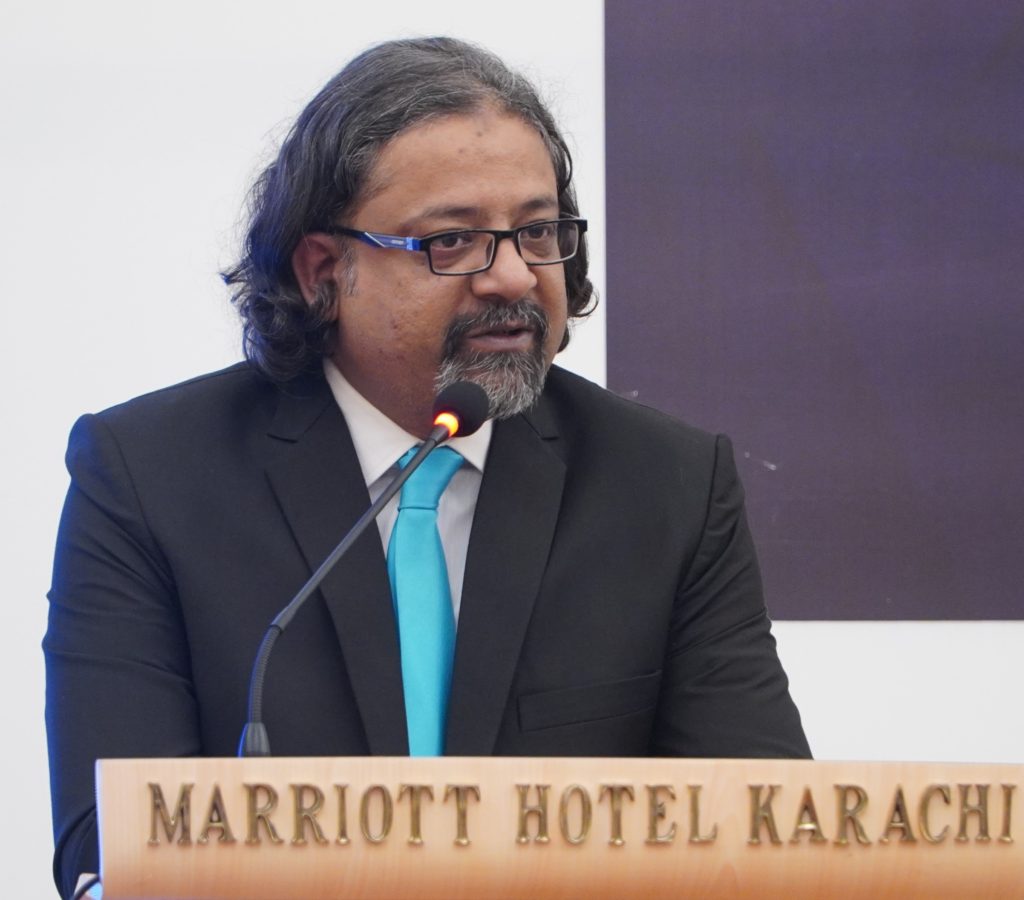
Salman Ali, CEO VRG: Thank you Huma. Ladies and gentlemen, a warm welcome to everyone and especially to our chief guest. AMA scheme; four years, hard work, lots of ups and downs, the major thing I must say about this scheme that this has been launched with the collaboration of all the banks and all the telcos. Before going towards what we have achieved, let me tell you that I’m very fond of soccer, and there’s a player called Pelé, he says, “Success is no accident. It is hard work, perseverance, learning, studying, sacrifice and most of all, love of what you are doing or learning to do.” Then you achieve something which is long-lasting and which will stay with you. So here it is, this AMA scheme. Let me show you what we have achieved with telcos, banks and with VRG.
A very quick one; for the first time in Pakistan and in Asia, we have implemented a many to many model where we have all the telecom operators and all the financial institutions as well. Just think about this implementation that any person, using any sim, can open up any account in any bank just within one minute. What I want to say is that you guys have done it, not VRG, we all together have done it. This has been recognized by the World Economic Forum and also by Queen Maxima in the World Economic Forum during her speech. Right now, this model is under evaluation in different developing countries, and these developing countries are also contacting VRG to have this implementation done in different parts of the world. This is what I’m telling you, that this is all that you guys have done.
So let’s move on some quick stats on what we have achieved up till now. This is very interesting by the way. By 31st July, we have been able to secure some good amounts of numbers. Obviously, there are some good players who are catching up, but let me tell you one thing that I personally want to thank you. Some people over here, some institutions who actually held our hands when we started this journey four years back. Thanks to Jazz, thanks to HBL, thanks to UBL and also thanks to Bank Alfalah that these institutions came to us and supported us to take this thing forward, from the POCs to get these things up and running and make this thing possible so that others get attracted and come over and join the show. So I’m really thankful to Mr. Amir, Mr. Abrar, Mr. Adnan, and obviously Mr. Ali Naseer thank you very much for this.
Moving forward, we have another slide that is the account linked, this means that a person’s existing account can be linked. So again, we have seen a very good number by this period, and other player are catching up. A very significant figure at least for the VRG as a company in this arena, we’ve been live since early last year on this project, we have achieved nearly 41 billion landmark on the financial transactions number, so this is again something which we have achieved with your collaboration. We have a very important thing that how many transactions have been taking place. We have nearly around an average of 30% financial transactions taking place, which is very good number with respect to the branchless banking industry. We have the gurus here from the branchless banking industry who know these stats very well, but let me show you a very interesting thing and that is the analytics. Up till now, under this AMA scheme, we have nearly around 4.5 million accounts and out of these 4.5 million accounts, as we speak today, 32% accounts are women’s accounts, which has never been done in Pakistan earlier. This is something which we have achieved through this scheme, but if you can see these stats, we have very good things coming up from KPK as well. It is a very good number which is coming from KPK and especially with respect to female account holders.
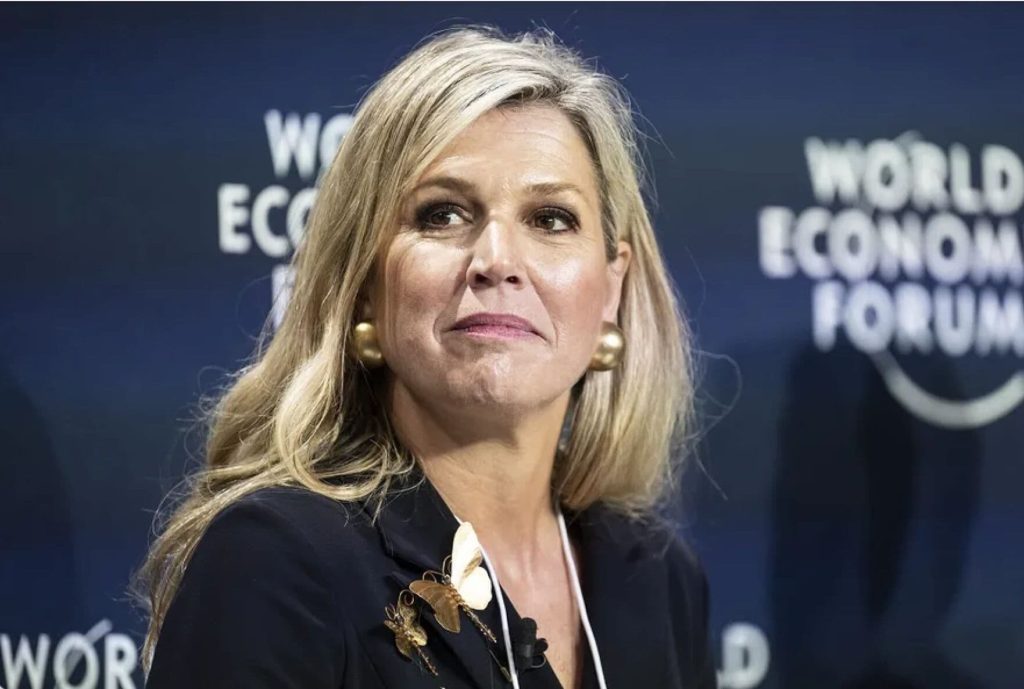
In countrywide transaction breakdown according to gender-based distribution, we have a very good number in the female and in the males as well. The main point is that this scheme is being adopted by that Aam Aadmi, that person who’s sitting at home and using this scheme without going to any bank branch or any agent as well. In this slide, these are the numbers which clearly show, these are the percentages from the provinces, especially if you see there is some traction in Balochistan as well, these are the areas which we need to take care of. With respect to the province-wide distribution, we have transactions by females and these transaction numbers especially from KPK and Balochistan are quite good. We are collecting this data, but let me tell you, fresh accounts have been opened in which female account percentage is 49.3%. This dropdown is because when you link the account and take the whole total, then it’s dropped to 32%. But let’s see that these are the numbers which we have achieved, which have never been achieved from any scheme previously.
We have started this scheme and now we all say that this has been launched, but this is just a start, it’s not the end. We have to build multiple use cases, we have to do some interesting use cases like instant credit, micro insurances, micro retail payments and above them all, we have to increase touch points for those people, and for that we have to work on agent interoperability to increase the touch points, which actually benefits the BISP and Ehsaas program as well. We are already in talks with those entities and we need your collaboration.
Last but not the least, I personally say that this scheme is our success. All the decision makers are here, but what about the executors? What about the team who executes it? So the teams who actually worked on it, who actually developed this thing, who actually made it operational on the institution side, on the VRG side, I want to congratulate all the people that were there. Thank you very much for doing this. Before leaving this rostrum, let me share with you some of my personal feelings today, this rostrum needs to be shared today and the person who actually is the main technical brain behind this whole scheme, who is actually running this show, who’s actually creating all the products. Whenever I call him and say, this is my business requirement; he says yes it will be done, and that person is right now missing in this hall. So Mr. Ali Shah Asani, you are equally welcome and you are equally missed here, and because of you, we have made this achievement. Thank you very much, guys.
Dr. Huma Baqai, Rector MITE & Moderator: Thank you Salman for those fantastic figures, they were very heartening. Celebrations are great, but before we have celebrations and before we reach the point of celebrations, there’s a lot of hard work, disappointments, frustrations, sweat and blood. Then finally you are able to achieve what has happened today or what we are celebrating today. Pakistan initiated its National Financial Inclusion Strategy in 2015 that is where finally the policy makers, the doers, people in corridors of power and on decision making tables decided that this is where the future lies, this was of course linked to the concept of knowledge economy. They said, if you want knowledge economy, it is going to take us forward, then we need a financial inclusion strategy, which came in 2015. We are in 2022 and it’s not so bad, only if we can carry it forward, we have ownership for it and the commitment. That ownership and commitment seems to be there. Because like I said earlier, there is a triangular nexus that allowed this to become a reality. One very important side was of course the PTA, and we are honored to have Major General Azeem Bajwa, Chairman PTA who’s going to speak to us through a video link.
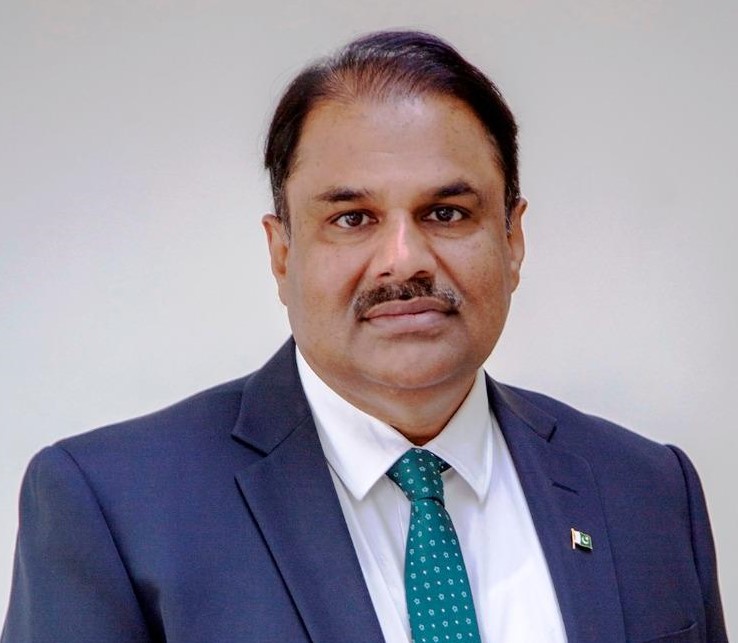
Maj Gen Amir Azeem Bajwa, Chairman PTA: Governor State Bank of Pakistan, Deputy Governor, Chairman Pathfinder Group, Mr. Ikram Sehgal, industry leaders, distinguished guests, ladies and gentlemen, Assalam-o-Alaikum, and a very good afternoon. I’m honored to be a part of this gathering to commemorate the launch of Asaan Mobile Account scheme, which is expected to revolutionize the mobile banking landscape. At the outset, I would like to congratulate VRG and all other stakeholders on the successful commercial launch of AMA scheme.
Pakistan’s financial inclusion rate is lagging in regional and global terms. According to global Findex 2021, only 21% of adults of Pakistan have bank account ownership compared to an average of 71% in developing countries. Adoption of financial services in Pakistan is mostly for making digital payments and as such access to savings or credits solutions is very limited. Women account ownership of 13% is still less than half of the men’s account ownership. Despite significant improvement through Ehsaas Kafalat Cash Transfer Program, which covers over 8 million women. According to Pakistan’s Bureau of Statistics, 93% of Pakistani households have mobile phone ownership, which shows a great potential for mobile based digital payments and other financial services to the unbanked. Collaborative efforts of mobile operators and banks have increased mobile banking accounts by 114% from 37 million in December, 2017 to 79 million in December, 2021, although, not all accounts are active. There is a strong need to make efforts to take this journey further to include the unbanked population in the financial system and help them adopt digital payments.
AMA is a unique model, where two leading regulators PTA and State Bank of Pakistan joined hands, developed a regulatory framework for this scheme and issued joint license to cater for huge unbanked population in Pakistan. PTA has made concerted efforts to facilitate VRG and integrated systems with all CMOs. With the joint efforts of State Bank of Pakistan, PTA, VRG, mobile operators and banks, today we have AMA scheme that is fully operational with great potential of contributing towards digital financial inclusion of common citizens and reducing gender gap. Ladies and gentlemen, government of Pakistan envisioned digital financial services through National Financial Inclusion Strategy where the game changers are the fintechs. However, the fintechs could only penetrate with the active participation of telecom players. PTA being telecom sector regulator is ensuring the accessibility and availability of the telecom services across the country. We have joined hands with State Bank of Pakistan while supporting, assisting and developing the digital financial services ecosystem in the country.
Just to give you a brief overview of the current state today, we have over 195 million biometrically verified SIMs and subscribers, with mobile coverage to over 89% of the population. We have 119 million broadband subscribers with availability of 3G and 4G mobile signals coverage to more than 77% of the population. Mobile operators’ widespread distribution network across country has resulted in over 150,000 retailers of mobile operators, which enabled fintechs and banks to open 79 million m-wallet accounts and over 587,000 m-wallet agents. For identification and digital onboarding of customers, we have integrated the systems of Pakistan mobile network portability database and mobile operators with the banks and also implementing multi finger verification for SIM issuance. For the low cost device ecosystem, the implementation of PTA’s device identification, registration and blocking in 2019, has also resulted in significant increase in legal import of mobile devices and establishment of over 33 local assembly plants in Pakistan. We’ve locally produced over 64 million mobile devices, including 4G smartphones since implementation of the system.
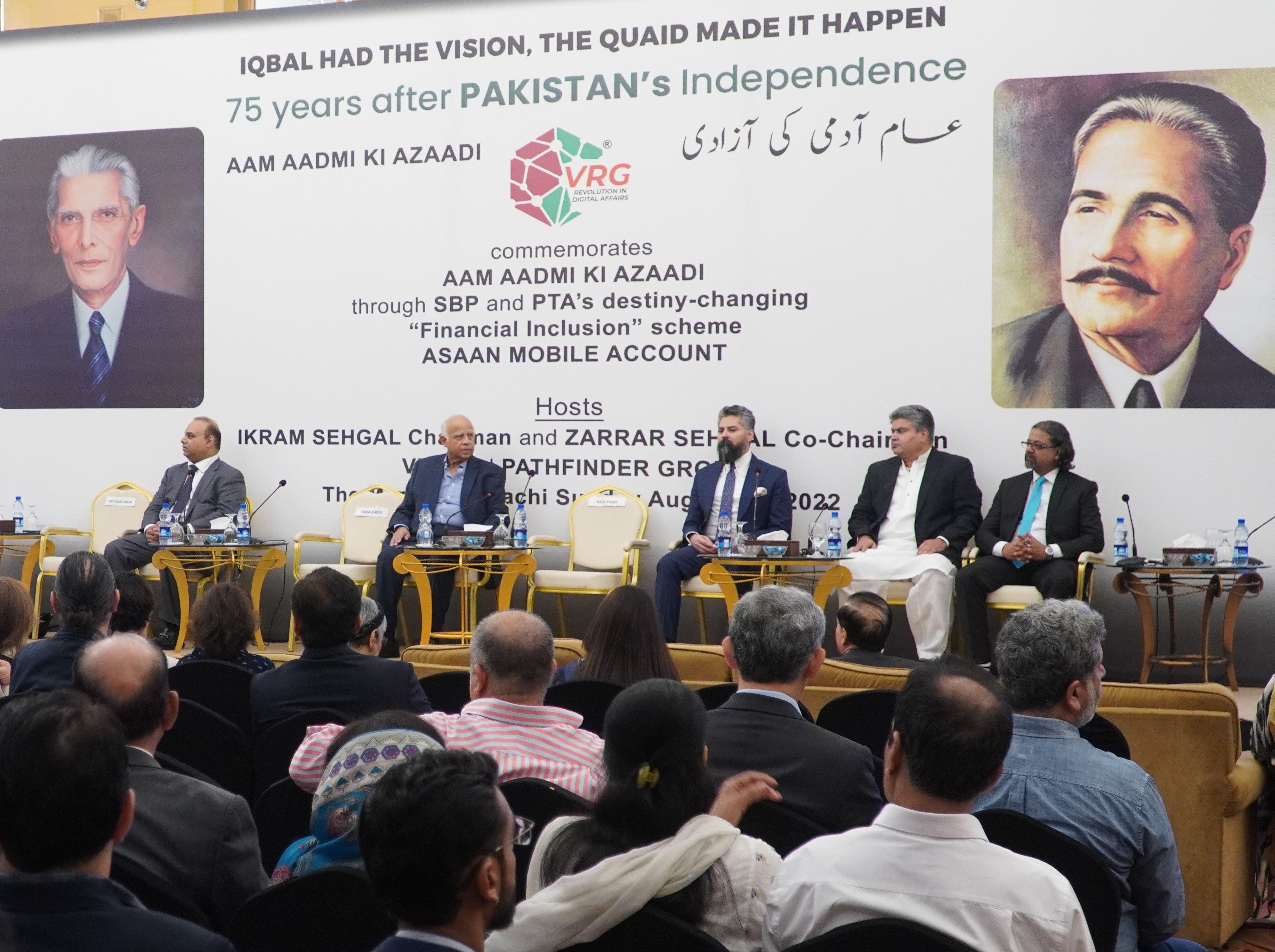
According to GSMA, the gender gap in internet awareness in Pakistan has declined from 16% to 11% and PTA is committed to ensure access to all and improve gender inclusion in high cities in Pakistan. Ladies and gentlemen, under the National Financial Inclusion Strategy, PTA remains committed to strengthen the digital ecosystem for payments and financial inclusion in Pakistan. In this regard, AMA scheme will play a pivotal role in women’s economic empowerment through improving their socio-economic status in the country. With significant population of Pakistan being unbanked, the AMA scheme will go a long way as ubiquitous financial services will now be available and accessible to a huge market of over 195 million biometrically verified SIMs and subscribers. The AMA scheme was designed with the objective to provide easy, swift, secure and cost-effective channel for accessing financial services, with complete interoperability amongst operators and financial institutions. I’m confident that the scheme will achieve the broader objectives of financial inclusion in the country, which is at the heart of all efforts of government for a growing, stable and documented economy. I once again congratulate all the stakeholders on the launch of AMA scheme. I thank you all.
Dr. Huma Baqai, Rector MITE & Moderator: We have another video message by a very important person, and that is Mr. Shahzad Dada who’s the President of UBL, but just to share a small nugget of information with you, Pakistan’s population, we all know is now exceeding 220 million. Pakistan is an emerging mobile economy and posts a high mobile phone penetration of 85%. And there’s a global consensus that in countries where the infrastructure is poor or in some cases, non-existent, this is the way forward. So Pakistan is catching up, but we are still way behind, if I may also quote this here – the numbers that we have. As per the most recent Financial Inclusion Insight Survey 2020, top-line financial inclusion in Pakistan is estimated at 21% expanding seven percentage points since the last two were conducted, which is in 2017. It is still significantly low in our country because when we compare it with similar economies; for example, India’s profile is 78%, and Bangladesh, which is more comparable is 47%. There is no way we can let go of using this 85% mobile penetration and convert it, and make it a part of our financial inclusion strategy. I’m sure that there is complete consensus in the room and elsewhere about it. I will now request the organizers to play the video message of Mr. Shahzad Dada who couldn’t join us personally because of his other commitments.
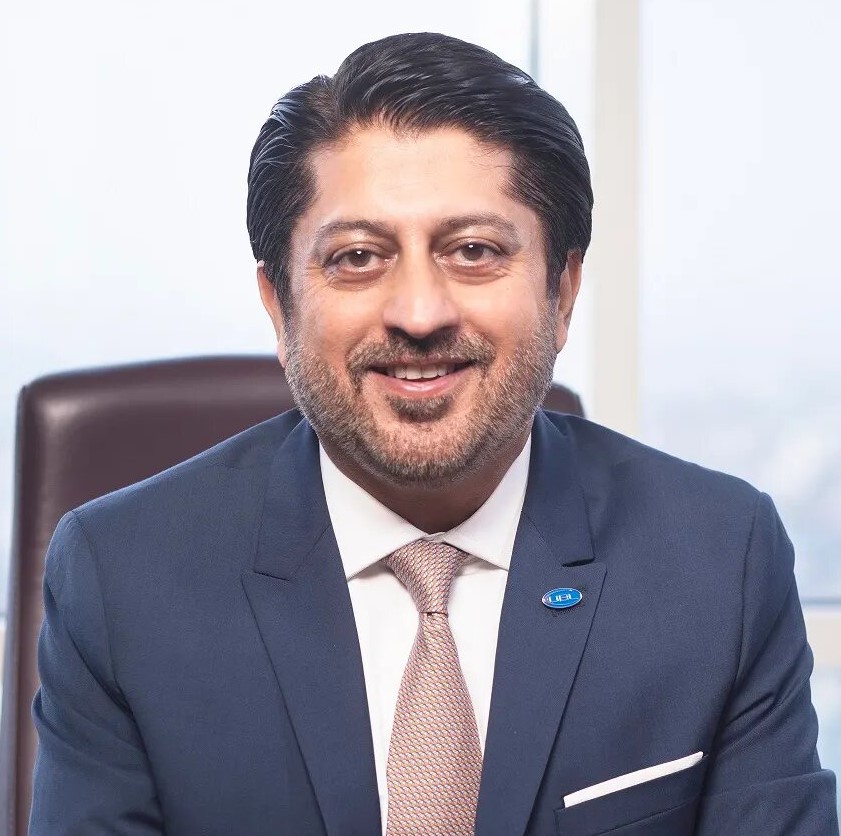
Mr. Shahzad Dada, President/CEO UBL Bank: Bismillah-ir-Rahman-ir-Rahim. Assalam-o-Alaikum. I really wanted to be there in person with all of you, but unfortunately, given the change of date of this event and my travel plans, I will be unable to. Before I share my brief thoughts, I just wanted to share some key statistics with all of you. One; 70% of our population is under the age of 35. We have the highest teledensity in the region at 85%. Yet, only 20% of our population is banked. While I do realize the challenges that we have on banking, the remaining population, including the lack of documentation available and including the lack of availability of internet and smartphones with the userbase, Asaan Mobile Account is indeed the solution to these challenges and for that, I would like to congratulate Ikram Sehgal sb, Zarrar, Pathfinder and VRG for taking this important initiative and also congratulate them on today’s Aam Aadmi ki Azaadi inauguration event. They worked tirelessly with all the stakeholders, including State Bank of Pakistan, PTA, NADRA, World Bank, and the participating banks to ensure that this becomes a success, and based on that, they’ve been able to open almost three and a half million accounts, expected to grow to 50 million. As UBL, we are very proud to be partnering with them, and we are very much determined to help them achieve their goals, because it helps the overall cause of financial inclusion, which is something very near and dear to our purpose.
We are looking forward to working more closely with them. Let me end my message by simply asking all of you who are not already an AMA account holder, take out your phone, dial *2262#, and become part of the AMA family and, and a change agent in the financial inclusion agenda that this Group is tirelessly working on. With that, Khuda Hafiz, Pakistan Zindabad. Thank you very much.
Dr. Huma Baqai, Rector MITE & Moderator: Interestingly, my students, all of them are now wanting to have these accounts. And I was very surprised because I don’t know if they were a target audience and I’ll ask the people here, but a lot of students, 18 year olds, 19 years olds and 20 year olds are doing it. Another president of a bank here, President UBank, Kabeer Naqvi sb will now address.
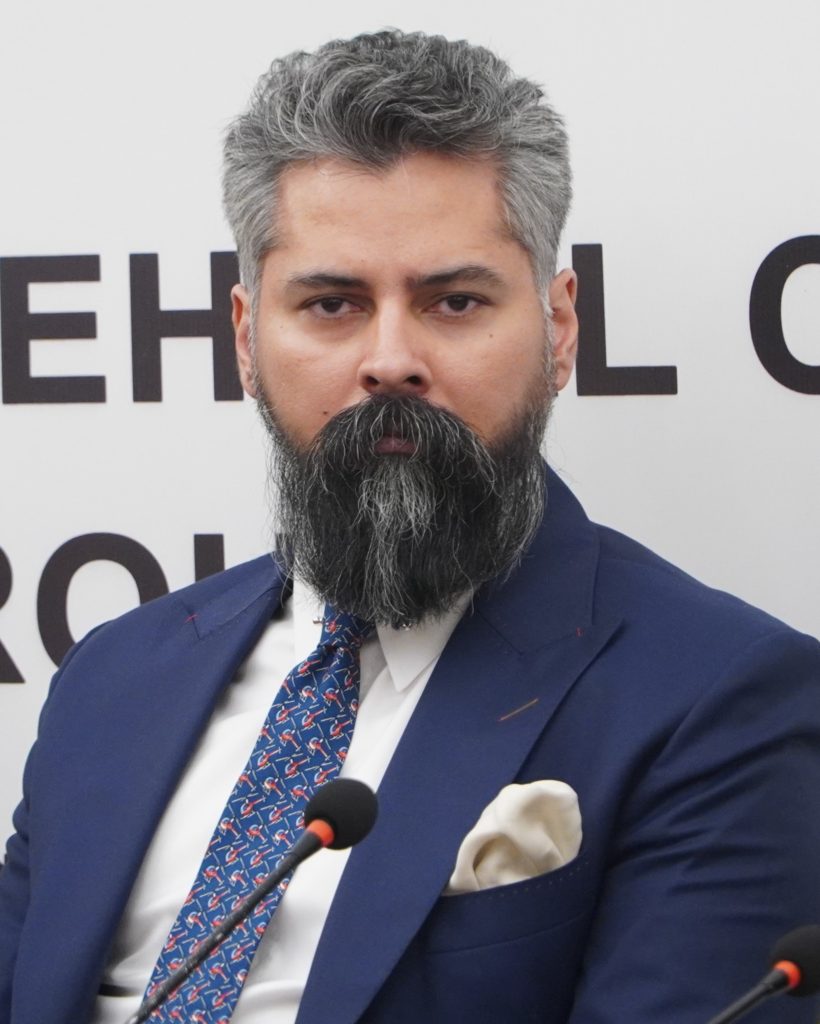
Mr. Kabeer Naqvi, President UBank: Assalam-o-Alaikum everyone. Mr. Ikram Sehgal, Deputy Governor Sima Kamil, Reza Baqir sb, ladies and gentlemen, very warm welcome to all of you from my side. I’m very happy to be here today. I will take the first five minutes to just develop some perspective as to how did we get here from a practitioner’s point of view. And today we are talking about AMA, which is a telco-agnostic and bank agnostic mobile wallet, but the journey started many years back. Back in 2007, 2008, when the Central Bank took a very brave decision of launching the first bank led branchless banking model in the world. I was part of the team that indulged into this whole process of branchless banking and offering services outside of the brick-and-mortar setup. I was part of Tameer Bank, Nadeem was here, he just left, Telenor and Tameer Bank, we started this service in 2009 and the name is a household name now, followed by Jazz, Ali is sitting here and UPaisa, which is a brand that we have with our sister concern Ufone. Now, initially, we went with a super agency agreement because there was no blueprint. Either we had to go with the service level agreement, who will own the customer, where will the revenue be parked, so there were a lot of taxation issues that had to be solved because this was the first time this was happening anywhere in the world.
Now, nearly 14 years down, I’m very happy to be here and I would really want to congratulate State Bank, PTA, Pathfinder Group and all of you that we are seeing a solution finally, which is not a one-to-one model, which is a many-to-many model and which is completely customer centric. So this is one area that we took more than a decade, one and a half decade, to be precise. Now, from here on, I’m sure many of you indulge in this wallet business. Many of us have different wallets on apps and USSDs. I would want to touch upon the distinction between a wallet on an app and a wallet through a USSD string.
As smartphone penetration is increasing in Pakistan, which it is, the general perception is that with the smartphone penetration, you will be totally telco-agnostic and you can open any service wallet on your app. Now I’ll share my personal experience with you because I work for a microfinance bank and I do around 6-7,000 road miles every quarter. Last week I was in Nagarparkar, Chhor and other areas. And for three days, I was struggling with the service obviously, and there were rains also, and the towers and petrol issues. A lot many issues are going on in the country nowadays, especially. So how do you actually get people on board onto this beautiful railroad that we’ve made and how will people use it and what will they do with it, that’s the natural next question. Many people argue that the days of the USSD are over, in my view as a practitioner, when we talk to our customers, when we see our data, it’s not true. In my personal view, USSD is going to stay, and for a long time. Now that brings me to my next argument, or concern or statement, whatever you may want to call it.
Reza Baqir sb is sitting here. Three years back, maybe he remembers, in a meeting, Ikram Sehgal sb and myself, we were there and it was early days for AMA launch and we were doing the pilot and we said, you know, eventually, if you look at the regime in which the accounts are being opened, level zero, level one, level two, when we graduate to level two mobile wallet on AMA, which has higher limits, and you can do lot more things and regular customers can actually use this as a regular bank account, not just with a smaller limit or fewer transactions, that is where the real volumes are going to come in, and obviously it had to be a journey and three years down, ma’sha’Allah, we are there and the natural graduation would be, you know, if we are able to provide credit, savings products and other banking services, another point that I would really want to touch upon here, which is very close to my heart is the why part. Why are we opening these wallets? Why do we want more wallets? How many of these wallets once when they’re open stay active, what is the definition of an active wallet, what is the value proposition for the person that we are trying to bring into the financial net? Many people say that financial inclusion or digitization, it’s borderline buzzword as well, which I don’t agree with, but what is the reason why we are investing millions of dollars and people are spending time, regulators are spending their time, effort and globally, we have very good examples, but in the Pakistani context, as Shahzad was mentioning in his message that 65% plus people are less than the age of 34, but 26.6 million children are out of school. The education level, financial literacy, when you go down in the field where the rubber meets the road, you see the real landscape, you see the real story, and this is what I wanted to bring into this hall in Marriott today, what I saw in my recent trip also, which I see every quarter, as to what the reality is out there.
A lot of work needs to be done on financial literacy. That’s why the brick-and-mortar and digitization are not mutually exclusive in my view, they go hand in hand in a country like Pakistan, because bulk of the brick-and-mortar branches are in the higher cities, tier one cities, tier two cities. What we are trying to do in our institution as well, we are trying to go to the last mile as much as possible and that has its own issues. It’s very expensive also; yes. But eventually when we hit critical mass, it’s going to serve the purpose that we are looking for. So, these are a few thoughts that I wanted to leave everybody with, today while it’s a great time, we’ve got this whole business of wallets booming in Pakistan, we’ve got millions of mobile wallets. We’ve got real use cases kicking in. We are into nano credits, other stuff as well. But at the end of the day, when you look at a client centric approach, when you think about what does a 26 year old boy or a girl in Dadu city with a mobile phone, with a feature phone, do with say, an AMA account, that is where the thinking needs to go eventually, for product development, for usage. So, the railroad is there, it’s out there, the regulation is there, the risks have been identified, it’s been laid out. The mobile wallets are being opened. But now from here, the real challenge, and again, as I said in the beginning, this is the practitioner’s view, when you hook people onto these wallets, what do they do with this wallet, and what do we do with the savings that we acquire onto these wallets as banks. Because there is a full loop that needs to be considered for the value proposition and in the end, I would just want to give you an analogy, an example that I usually share with people. I read somewhere a few years ago that one of the companies had digitized a Biryani stall in Lahore somewhere. And people were very happy that this person through a QR code is accepting payments and they have digitized it. So, the person would collect cash and then take the cash home and we had digitized the whole process, which is great. The person was making one daig or two daigs of biryani a day and after collecting payments digitally most likely was still making one daig or two daigs of biryani and efficiently collecting cash. So efficient collection of cash through a digital railroad is, in my personal view, a huge part of transformation, but not the entire thing.
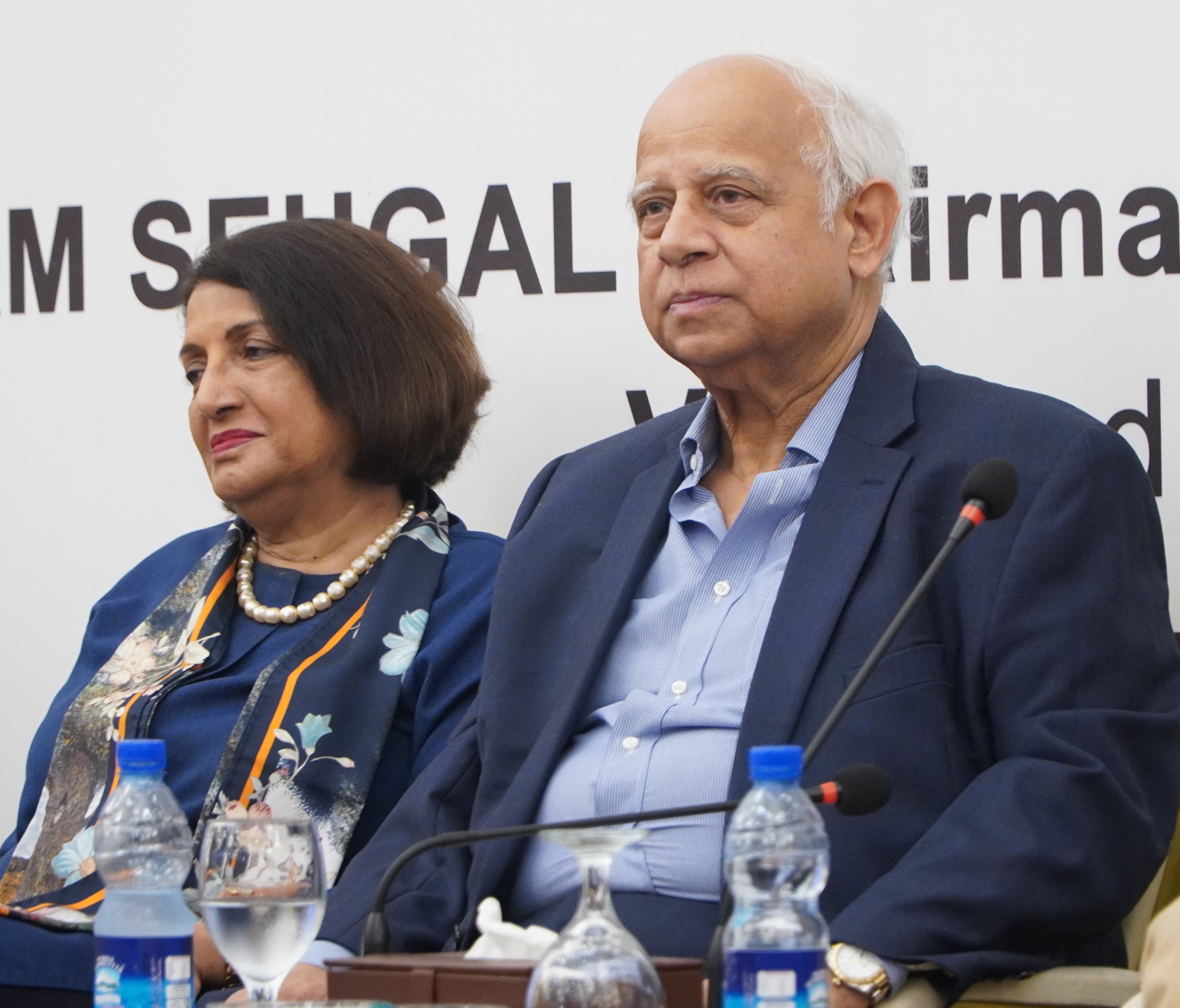
What if we used the data that we acquired on the wallet, and then offered credit to the biryani chap so he could do 10 daigs and then increase productivity and the income levels and graduate him to a shop. This is where it has to go and payments and credit needs to be looked at from a different lens because we lend to the masses unsecured via income proxies, it’s a different world out there. When you’re talking about transformation of lives, you have to talk about providing unsecured credit, and that is a longer journey. That is a risky journey. Capital is involved. Risk is involved, but this is where we ought to go as an industry. So, these are my few thoughts and I would once again want to congratulate Ikram sb and everybody on stage and in the audience. Thank you very much.
Dr. Huma Baqai, Rector MITE & Moderator: A practitioner’s view is critically important, but there are also some facts that we should probably look at and see that have we made the kind of progress we should have made or it’s time that we pull up our socks and roll our sleeves and actually get things going. Because if you look at how financial inclusion has worked in Pakistan, it was a national priority for Pakistan way before many other countries adopted it because the support for the microfinance sector dates to the 1990s and in 2001, the government began to allow the creation of microfinance banks. We were one of the first countries to adopt branchless banking regulations in 2008, which of course paved the way for introducing digital financial services in the country. With the Benazir Income Support program in 2010, the government began to digitize safety net support for 6 million poor households through women, and of course, inclusivity comes in. The Ehsaas Program is again through mobile, digitalization, financial inclusivity. I just wonder that have we explored its potential or there’s a lot more that needs to be done. And I think somebody who can really talk about this here is Mr. Ali Naseer sb who is the CEO of Jazz. He’s going to talk about what mobile phone does for us.
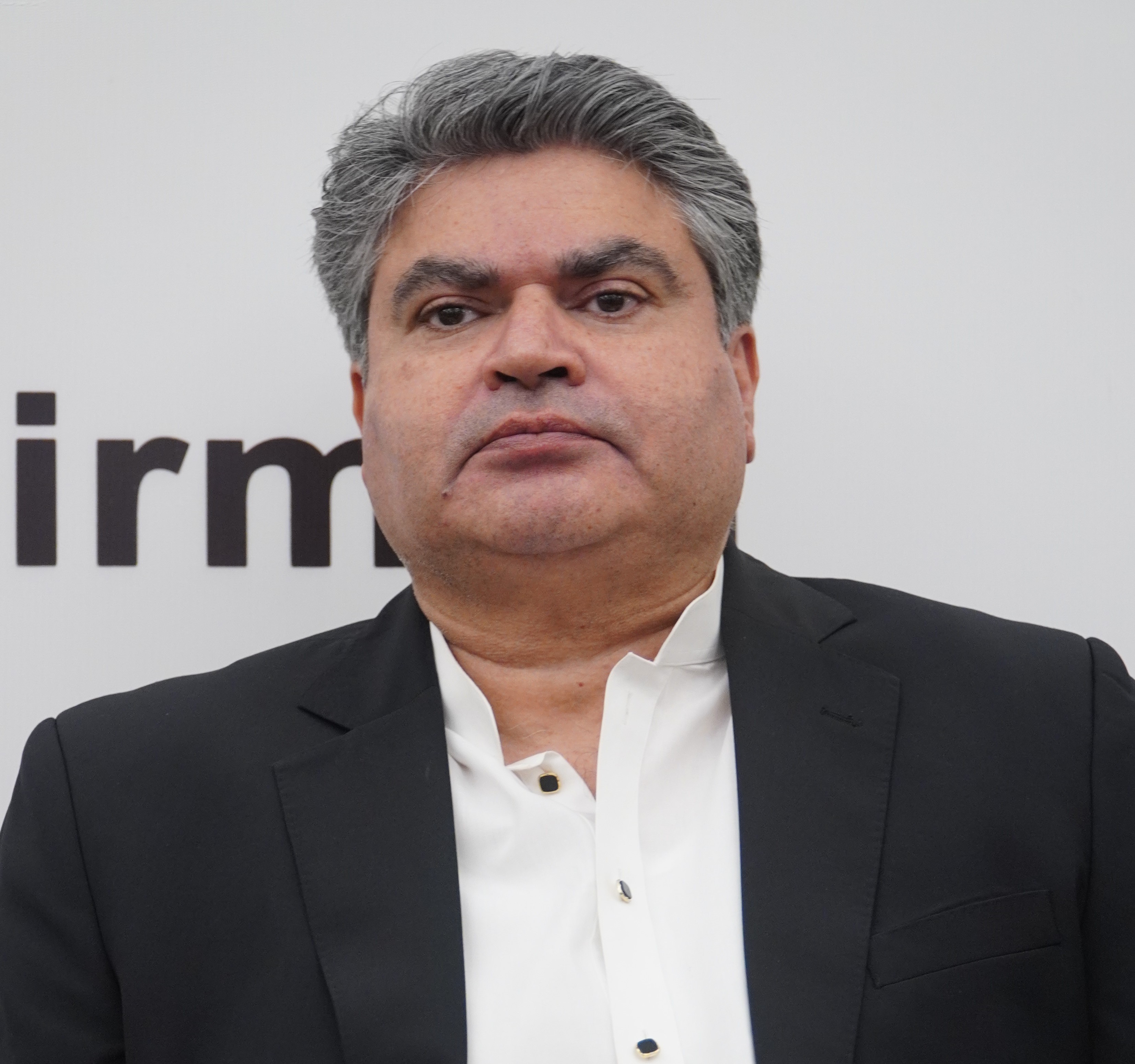
Mr. Ali Naseer, CEO of Jazz: Assalam-o-Alaikum. Ikram sb, distinguished guests, leadership of VRG. Thank you so much for inviting myself and Jazz today to be a part of this function. This is not just a commercial offering. I think this is a big service to Pakistan, and as you’ve seen through some of the stats that Salman has shared, and the journey that Kabeer has talked about, this is a big milestone in that journey.
I’m not going to bore you with stats. I think Salman’s done a great job of that, but let me just say that the number that only 21% of the population is banked and the fact that the number of women is less than half is hugely problematic. Not only is it a fundamental right, for every Pakistani, every human being for that matter to be part of this financial system, but I can assure you, it’s holding Pakistan back. It’s holding Pakistan back in its progress, and it’s something that needs to be done. The sad part is that this is not rocket science. This is happening all over the world. Dr. Baqai talked about the NFIS the National Financial Inclusion Strategy that was put out in 2015, but sadly due to the political uncertainty and the economic turmoil that we’ve been experiencing, a lot of what is in that document still remains to be implemented.
However, I think the last few years, and we’ve got two protagonists, Dr. Reza Baqir and Sima Kamil on stage who have been very, very supportive of moving this digital agenda forward. Raast, I think has been a spectacular success and Asaan Mobile Account, and I’ll talk a bit more about that later, is a step in the right direction.
As I said, this is not rocket science. Kabeer has talked about a different dimension, not every person is going to be owning a smartphone, not every person is going to be going to a brick-and-mortar bank, not every person is going to be just using a USSD. I think the objective should be that we should have enough variety and diversity in our financial instruments that they can appeal to every Pakistani, and AMA is a significant step forward, especially for the Aam Aadmi because of its use, its ease, its convenience. I’ll share a very personal anecdote, Ikram sb if you permit. When Ikram sb first approached and VRG approached the telcos, Jazzcash still is and was then the largest mobile wallet. I remember after the first meeting, I sat down with my team and I said, here’s the VRG proposition, what do we do about this? The consensus immediately, and it took about a minute and a half said, no, we are the largest wallet, why should we let them come to the market? I think that sentiment is also echoed in a lot of places in Pakistan where people look at very immediate concerns without looking at the larger picture. Jazz got over its initial hesitation, and we are very proud to be the first telco that partnered with Ikram sb and VRG. I think the results are spectacular, if I’m not mistaken Salman, Jazz is the largest component in the VRG percentage, right? Salman: Yes.
The moral of the story and what I want to reiterate, ladies and gentlemen, is that Pakistan has a lot of potential. The chairman PTA talked about the fact that we’ve got 89% phone penetration, but smartphone penetration is still 40% and we saw recently that network was down because of floods. These things will keep on happening, but we have to find technological solutions to that. We have to find solutions like the Asaan Mobile Account. Let me just say in the end that this is a labor of love. I think Salman alluded to it. There were numerous times where I met up with the VRG leadership to try and understand why we were not making the progress we wanted, and honestly, lesser men and women, Ikram sb, would’ve fallen by the wayside. So, credit to you that you remained steadfast and pushed it through. Very glad to be on stage to see the commercial launch of Asaan Mobile Account and I’m convinced that this will be a significant partner in Pakistan’s progress. Thank you.
Dr. Huma Baqai, Rector MITE & Moderator: Thank you Jazz, but you see, you say there is political will and there’s financial bill but nothing moves forward unless you have the regulator’s will and that’s where State Bank comes in and yes, the leadership is fantastic. They’ve been very supportive, but let’s hear it from the horse’s mouth. Sima Kamil sahiba, Deputy Governor State Bank, please honor us with your presence here,
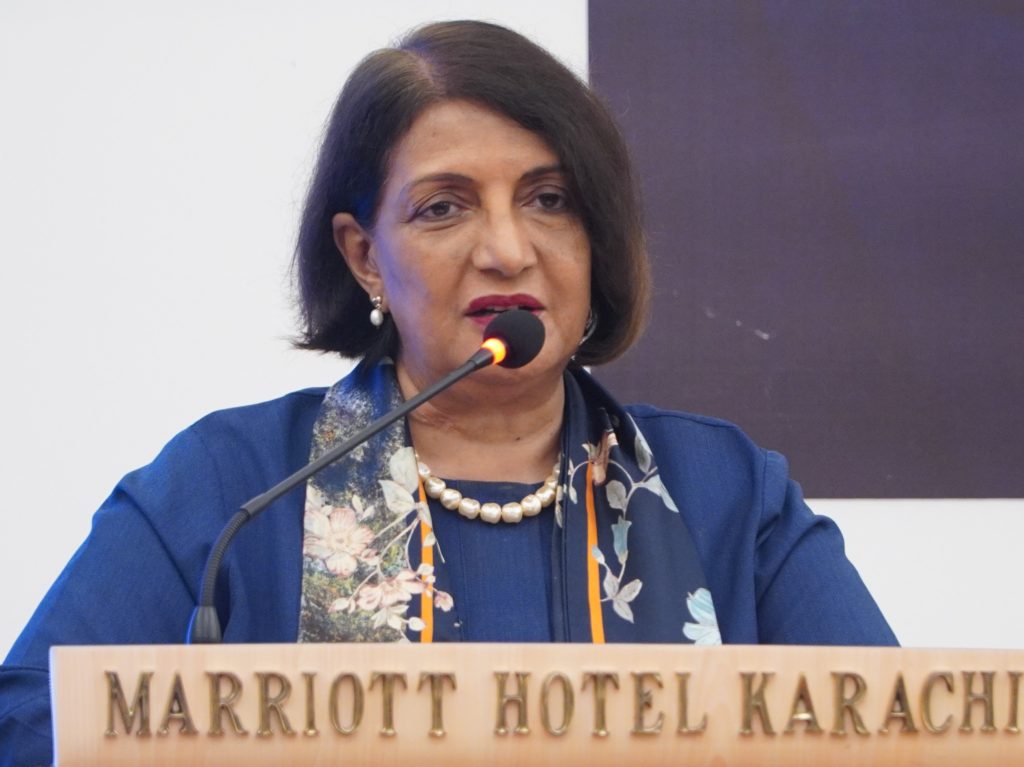
Sima Kamil, Deputy Governor, State Bank of Pakistan: Assalam-o-Alaikum everybody. I’m particularly glad Ikram sb, that you’ve given us this opportunity and we are also very honored that we have two former governors of the State Bank with us today, Mr. Yaseen Anwar and Mr. Reza Baqir, who’ve all played a major role in this journey. First of all, congratulations to all of you on AMA.
I’ll just go a little off script and say that it’s been a long and difficult journey. There have been times when the two regulators, the State Bank and the Pakistan Telecom Authority almost thought that this will not happen. And we often had discussions with Dr. Reza Baqir that when will this happen and I think the persistence paid off. And I think some of that persistence, a lot of it is really due to Mr. Sehgal because he did not give up, we had some amazing challenges, and even now, if there’s somebody I speak to every day, it’s Mr. Sehgal. He’s discovered that he can call me at 8:30 every morning, because he knows that’s when I’ll answer otherwise I’ll send a message and say, I’ll call you later. I think credit to that, and I’m very glad Zarrar that you are here also and I hope that you will continue to take greater role in this. Of course, our partners, PTA, NADRA branchless banking providers, the CMOs have all played a major role. Just to say, we had a soft launch in December, 2021, which Dr. Reza Baqir was kind enough to chair at the State Bank and we called it a soft launch for a certain reason. The reason was that we hadn’t gone and done all the commercial media and that actually began on August 11th and even then, there were last minute issues and last-minute phone calls and all of that went on between myself and Mr. Sehgal and the rest of our team. Why we called it a soft launch, now we have that and I think it’s important and we haven’t acknowledged the entity that has actually funded the commercial launch, which is widespread, it is TVC, it is social media, it is print and that is the Foreign and Commonwealth Development Organization that actually were very patient and while they’re not present here today, I think it’s important to acknowledge what they did and they extended their program, partly because we needed to get this launch done. Of course, this is only the beginning. This remote account opening journey began in 2016 under the branchless banking regulations and you could open accounts and operate them from the comfort of your homes. The result of all of this has been a huge increase in overall bank accounts. We’ve talked to a lot of numbers here. Sometimes those numbers don’t match up, but numbers from the State Bank, I guess, are the numbers from the horse’s mouth.
So we have grown; in 2016 we had 66 million accounts and at the end of December last year, we had 147 million accounts. So that’s a huge growth of 122% in five years. And half of these accounts, 77 million are branchless banking accounts. So, I think that shows to you the importance of that sector. Of course, there’s a lot to do and Huma spoke about that and the new Findex Report, we have 220 million people, 130 million are adults and our account ownership that is counting active and inactive, which is actually a big difference is 57%. And as we said before, the global average is 76%, the developing world 71%, India 78%, Sri Lanka 89%. So, we are quite low in that. While we can talk about our numbers and our huge increases, it’s really not good enough. We have 50 million financially excluded persons in Pakistan. You talk about Aam Aadmi and I’ll come back to it. Not many of the so-called Aam Aadmi is here today, but they are excluded. And then if you start to look at activity, 10% accounts have only one transaction in the past one year. Is it fair to count them? I don’t think so. Most of you here will do three or four at least a month. Most of the people who are low income will do one. They will get their salary and they will draw it out and that’s the end of it and I don’t call that financial inclusion at all. Financial inclusion is much, much beyond opening a bank account, and that’s why we have to, we will talk about the forward plan for AMA and then of course, while we’ve called it AMA, Sehgal sb, we have called it Aam Aadmi Account, we have to remember the women, so it’s the Aam Aurat also, which I think is extremely important. Because not only do they not have bank accounts, only one out of three women has an active bank account. If those of you are here and all have bank accounts, you are the exception, and those accounts are not active. Unless we have that Azaadi and Azaadi is also for them to have phones. A lot of them, unfortunately, are not allowed to have phones and we all know that. That’s something that we have to work together with other stakeholders, particularly PTA and the CMOs, because that’s a very serious issue and thankfully quite close to the State Bank’s heart and the team is there, who is ready and I’m glad to see Faiqa there today also.
I have a few messages for the banks. First, they’ve got to increase the uptake we have put in, and for once we haven’t asked you – the banks – to fund it, we have done it through, as I said, FCDO but there is going to be a lot of ask from you now, as you know, we’ve pushed very hard on RDA, we’ve pushed very hard on Raast and we will push just as hard on AMA. I’ve already spoken to our team. And from tomorrow, we will have a daily sheet to see how this is tracking and we will be talking to all of you very regularly. I’m happy to say that while television and print and all of that makes a difference, unless you actually get to the Aam Afraad, actually show them how it works, it’s not going to happen.
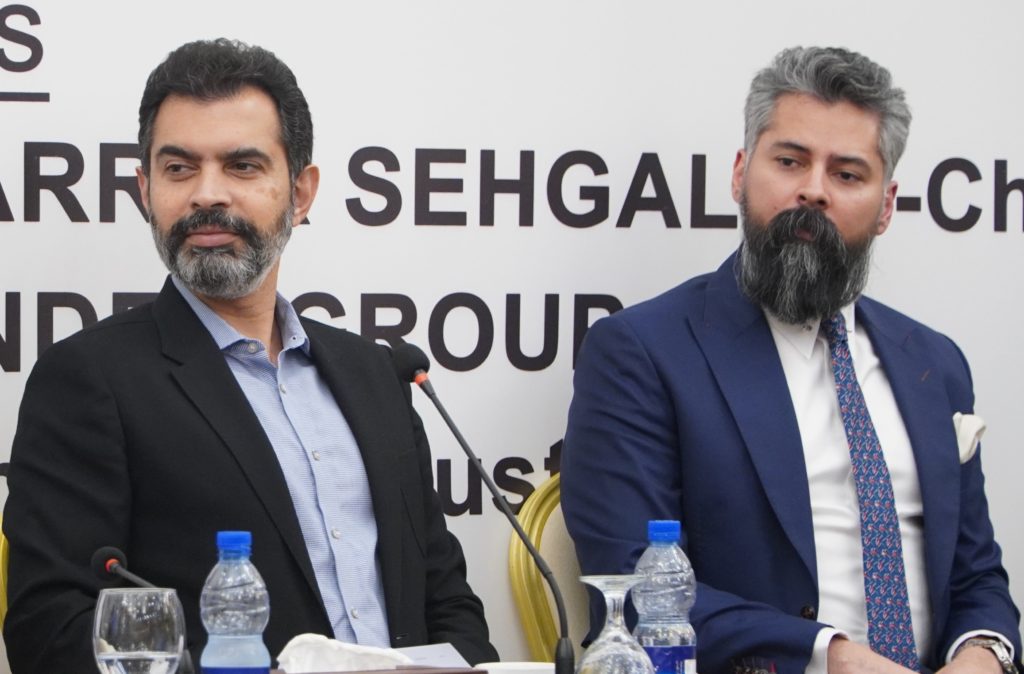
I’m pleased to say today that we are going to be doing two things in conjunction with the branchless banking providers; first we will be using our BSC offices. We have 16 of them and we will be actually bringing in people and getting them to open accounts, something that we did very successfully with our housing, and I think it could work just as well with AMA. You bring in people, they understand that they can open an account because at the stage we are at and with the financial literacy that we don’t have, they actually have to do it. And that’s the only way, you may have tutorials, we will try TikTok, we will try anything, we’re not going to restrict ourselves to the more high-end social media. We’re going to use anything we can, but eventually the one-to-one will matter and we will try and reach them wherever they are, whether it’s rural or semi-urban or urban. So that’s what we are going to be doing. and the team is sitting there waiting to go. Secondly, of course, you’ve got to work on the use cases. I don’t really like that word too much, because it sounds very technical and people switch off. What does an individual need from a bank? He needs far more than transaction, and we seem to have restricted ourselves to payment and transaction. I’ve been saying that a very long time and maybe get disappointed sometimes. But we have to be able to meet the four principle needs. Transaction and payment is only one. There is saving need, there is investment need, and I know you spoke about micro insurance and so forth. And then there is overall the credit need, unless you meet the credit need, you may open the account and it will fall away and it will become inactive, particularly for women, particularly for women entrepreneurs, particularly for people who run small businesses, we spoke already about the gender lens and the need for that and we are going to have to work with you one-on-one, and as a group to see what we can do to bring women into this.
Of course, we are working on that and it’s going to come out quite soon, it is the branchless banking agent level interoperability, which will improve customer accessibility and make life so much more easier for them. Before I close, I have two things to say: one; we have to set ourselves an aspirational target, so we talked about 4.5 million accounts, and I think about 3.5 when we started our soft launch, our target is going to have to be in excess of 10 million by the end of this calendar year. And so that’s what we will target, and that’s how we will give our targets to the banks that are part of this effort. Before I close, I have to thank our team here because they have been really – even when internally in the State Bank we talked about what is going to happen, is this going to happen – they were very, very keen on this, and I’d like to particularly recognize Mr. Samar Hasnain, Noor, Umair and Imad-uddin sb and Faiqa. Can we please give them a hand.
I know we’ve spoken about VRG, but they have worked very, very hard. And I think we all know that and every day and they kept saying, no, no, we have to have a bigger event. And now they want to have another big event, which we will have when Jamil sb is here, which we hope will be this week.
Thank you for listening to me, and this is just a start and I hope that we can have far more celebrations where these 50 million excluded persons feel truly included and feel welcomed, valued and respected. I say that like a broken record, but I will continue to do that. Thank you very much. Thank you.
Dr. Huma Baqai, Rector MITE & Moderator: So from Aam Aadmi ki Azaadi to Aam Awam and Aam Insan ki Azaadi. This is what happens when you bring women in corridors of power and on decision making tables. That is something which was fantastically pointed out. What was perhaps more important was better understanding of what is financial inclusivity. With all due respect and I’m a lay person, Sima ji, when I connect with an Aam Aadmi, there are about 5-6 Aam Aadmis connected to people sitting here, it is difficult to get cheques cashed for them. This is the first step which was critical and we will move forward from here. It is always the woman who will always, always celebrate her team. I think that was also something great, and last but not least, it was so refreshing to see a serving State Bank person appreciate and acknowledge the people who’ve served in the past. This is something our politicians need to learn from. With that, I will invite Dr. Reza Baqir sb, former Governor State Bank to say a few words.
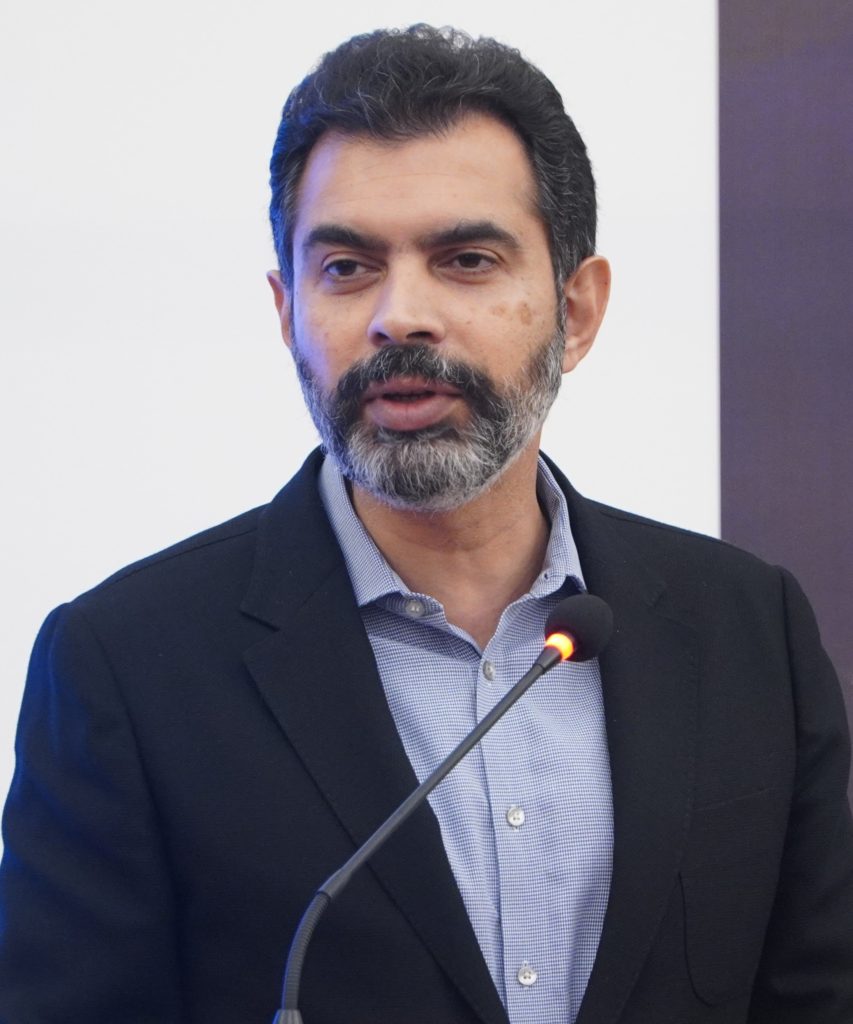
Dr. Reza Baqir, former Governor State Bank of Pakistan: Bismillah-ir-Rahman-ir-Rahim. Assalam-o-Alaikum. Ikram sb, thank you for the invitation to be here with you today. And let me recognize my predecessor, Yaseen sb, Sima Kamil sahiba, good to be at this event with you. Samar and your entire team, it’s really a great pleasure. Ikram sb, to see this day finally happening; I can’t tell you how many countless hours I had spent during my time as Governor together with Sima, together with Samar, together with many other colleagues trying to chart the journey, when are we going to finally get the State Bank initiated Asaan Mobile Account scheme moving forward. As you know, we did the soft launch primarily as an innovative way to get at least the messages out while we were waiting for the mass media campaign to get started. At the outset, the first thing I would like to say is that today is a great day that this formal launch is finally happening. And all of you who have worked hard for this, congratulations.
Asaan Mobile Account is one of the many initiatives for digitization in Pakistan which will take forward what is also already happening. First, I want to start by taking a snapshot, in our economy, what all is happening for digitization because it is important to take a step back and recognize or realize the scale at which digitization is proceeding. You may, or you may not know, but the State Bank of Pakistan puts out a very, very useful quarterly report on payments and it’s titled Payments, but it’s actually very illustrative to look at the magnitude of digital payments that are taking place in Pakistan. The last such report I believe is the one from March or at least that’s the one that I have my numbers from, and State Bank would now have more up to date numbers, but I want to quote a few numbers from there so that you recognize the scale of growth of digitization in Pakistan, especially over the recent few years. So according to this report released in March, and if you look at the period from July of 2021 to March of 2022, you will see first of all, that the total number of e-banking transactions, which are all transactions that pertain to banks or other intermediaries that happen through digital means whether it’s internet banking, whether it is mobile banking, whether it is other non-paper ways of banking, that has risen to 1.1 billion transactions in that nine-month period. That compares to 860 million transactions in the same period last year which comes to a growth of 36% in this fiscal year. When you look at the figures in terms of values or how much in Rupee terms is being conducted right now through digital means, in fiscal year 2021, over this period, that figure was 63 trillion Rupees. 63 trillion Rupees was the total amount that was being transacted. This fiscal year, though March, that figure had risen 52% to 96 trillion Rupees. 96 trillion, and this is a three-quarter figure. By the time you have the figures for the whole fiscal year, that figure would be well above easily, 120 trillion Rupees. So that is the scale and the growth is 50%. So if you just work that forward, and see what is the opportunity for digitization in Pakistan, you’ll be able to do the math yourself.
Another key statistic that I want to share with you in terms of digitization is one of the initiatives that was mentioned, which is Raast, Pakistan’s free, fast and secure payment system that was launched just a few months ago, and in just a few months, the number of Raast IDs has risen to 18 million Raast IDs. Now 18 million in a population that we have, around 200 million may not seem large, but the total number of bank apps that are in Pakistan on people’s phones is 21 million, so out of those 21 million, about 18 million people in Pakistan already have a Raast ID, which is important because it’s one of the State Bank’s huge initiatives to promote digitization in Pakistan. It’s free. It’s fast, i.e., in a few seconds, the payment is done and it’s secure. If you haven’t tried it yet, I really encourage you to try that. Now, these were just some figures to show everybody the broader scale of digitization activity that is occurring in our country.
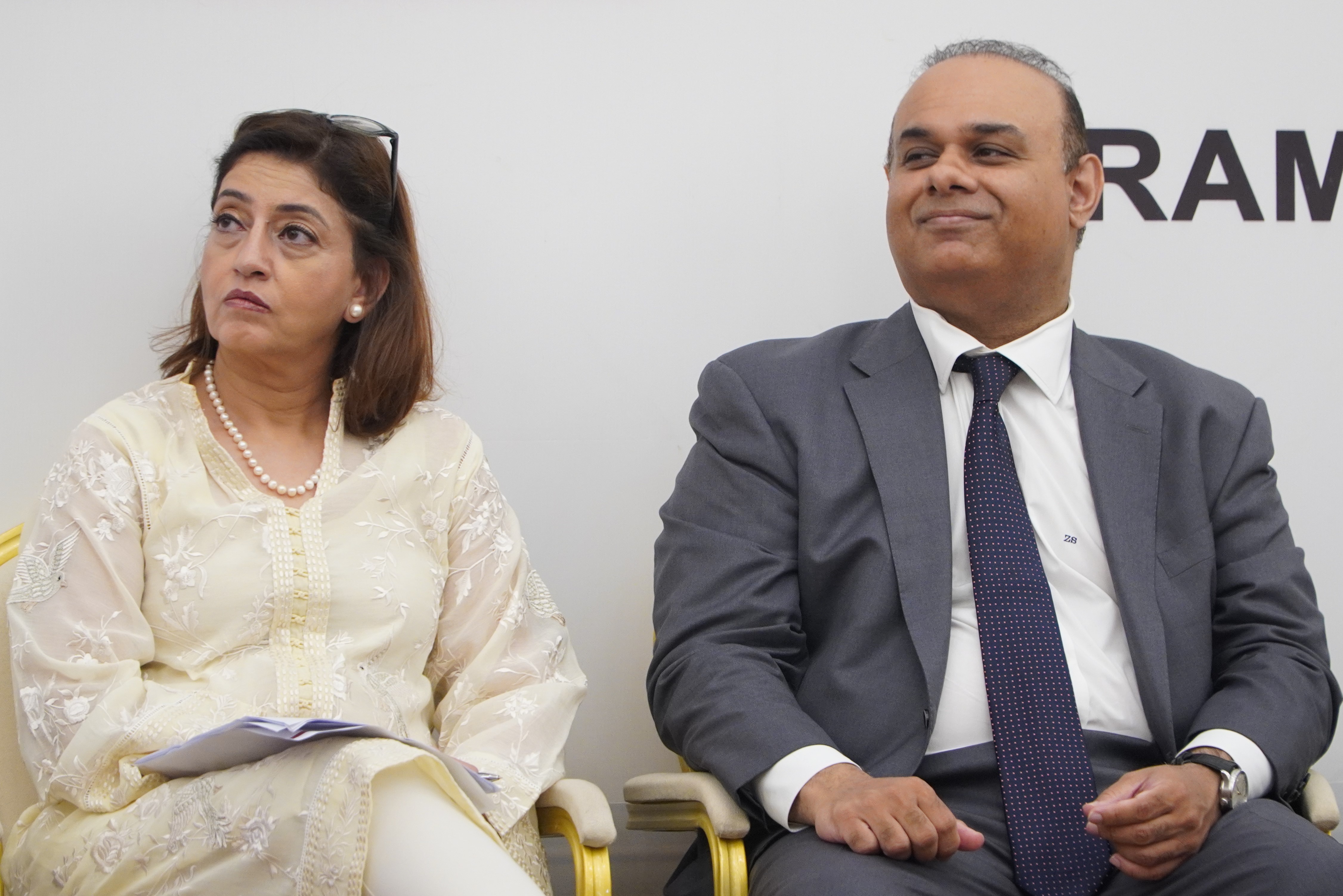
As Sima sahiba said, there is a lot more to do as well. She already shared with you some statistics about where we are in terms of account ownership. If she had shared these statistics in terms of access to credit or access to savings products, or access to investment products at the retail level, these statistics would’ve been a lot lower. So, we have a journey in front of us, a journey that I like to illustrate often by comparing the number of mobile SIM accounts, which is about 190 million to the number of unique bank accounts, which is around 80 million, according to the last figure. Sima sahiba said very aptly that there are at least 50 million people who can easily be banked, who are not banked yet. Now, in my view, a number of the initiatives that the State Bank has underway are going to deliver. I think, progress will be at a much faster pace than we have seen recently. I want to recap some of these so that people understand that there is a broader ecosystem of all the digitization work that we, the State Bank is pushing and want to then end about how AMA fits into all of those, so first is the digital onboarding initiative. This was launched a few months ago by the State Bank, and what it allows is that people with an app on their phone, it requires a smartphone, but if you have an app of the bank on your phone, you can do your remote biometric on your app on your phone, and you can open an account just simply by having an app.
Raast, I already mentioned. Third is the licensing framework for digital banks. This is a very exciting journey that the State Bank of Pakistan started last year. We have had very good interest in the country for digital banking licenses. I think soon the State Bank will be announcing the progress with that. Once licenses are awarded for digital banks, that’s going to be another game changer to make it easy for people to bank, to save and to invest. We have started and I think the State Bank will soon share something on that as well; a common Know-Your-Customer framework. When I was at the State Bank, this was to me, particularly important because if you have tried to open a bank account, or if you have tried to switch from one bank to another, you would know how difficult it is in terms of the number of forms that you are required to fill out, a common Know-Your-Customer framework is the framework where you fill out these forms just once.
On these forms, all the fields that banks typically ask for are kept in one repository with your consent, and then if you want to switch banks, you don’t have to fill out all those forms again. All you have to do is indicate that you consent for your information to be shared, and you can easily open a bank account in some other bank, the whole goal of initiative like this is to promote competition between banks and to put the customer first, to put all of you first. In our current landscape, sometimes we forget that banking is first and foremost, and should be first and foremost about you. Now, some of these examples that I mentioned of initiatives; our digital onboarding framework, Raast, digital banks, licensing framework our common KYC framework are all frameworks for our country that I believe are going to help bridge this gap that I spoke about. In this landscape, AMA, Asaan Mobile Account is a very, very exciting entry. And that’s why I started off by saying how glad I am that we are having this launch today. It’s important to recognize that AMA hits a part of the population that maybe is not being very well served by all the other initiatives that I mentioned, and this is particularly that part of the population that may not have smartphones, but they have a phone that has a USSD channel. And if it is as easy as calling *2262# to open a bank account, the population or the segment that AMA is going to integrate into the financial system is huge and it’s a unique opportunity for you Ikram sb, for being the only player in this space right now. So, the State Bank created the framework of Asaan Mobile Account, you are the player in this. You have a target market that in a way is prime for you because there are countless people that don’t have a smartphone, even people with a smartphone can access that and it is now up to you as well as the State Bank what you make of this. I am hoping and confident that you will make the utmost success of it as this journey goes forward.
Now, as you take this journey forward, and this is the note that I will end on, I have a few suggestions for your consideration as somebody who was there when this whole scheme got launched. And to the extent they prove useful in achieving the type of growth that you want, I would be very, very happy to have contributed. The first is something that Sima sahiba touched upon, which is communication. The mass media campaign has been launched, I believe, but I think there is an opportunity to do a lot more, so that you get to any woman, and I’ll say woman first, and any man, and, at least one out of two should know what an Asaan Mobile Account is. Would that be the case right now? Probably not. But set yourself the goal, do focus groups, and until you see that one out of two women or one out of two men know what it is or have tried it, don’t relax. There are lots of different ways in which one can communicate. The State Bank recently has been very innovative in communication tools.
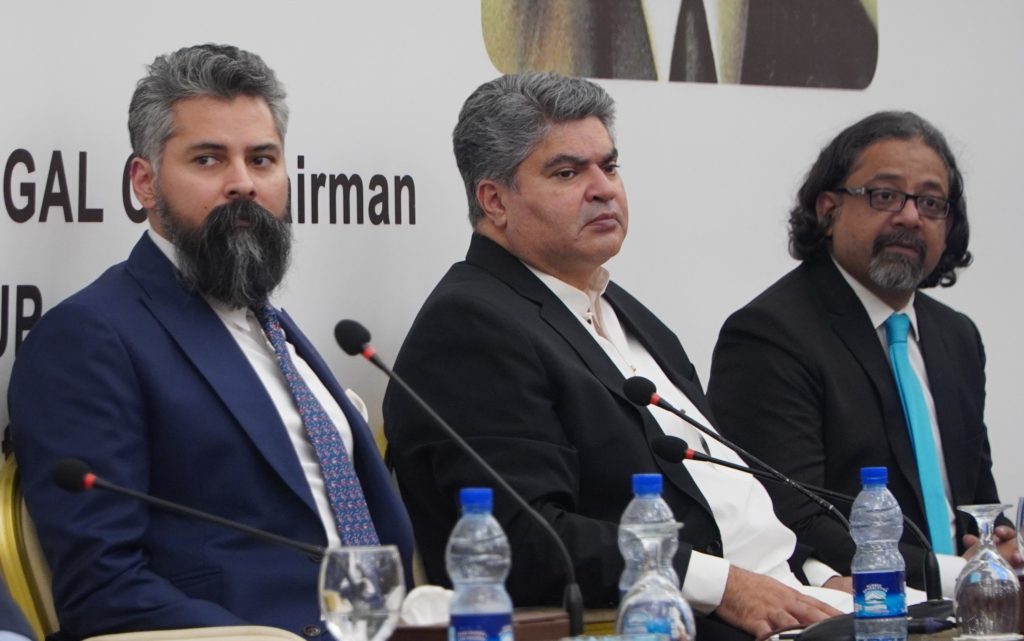
For those of you who know. The Roshan Digital Account Initiative of the State Bank; the State Bank even went so far as to create a song to celebrate the Roshan Digital Account. It was something that the State Bank had never done before, to put songs together, but it was done as an innovative way to communicate and it had a big impact in terms of the outreach of the Roshan Digital Account Initiative. So, number one, I would encourage you is on the communication. There’s a long way to go. Second is the customer journey. I think it is easy simply by texting or calling this number, but what happens after that, it has to be made even easier and made even simpler. You are working in a culture where typically your financial institutions are not geared that way to think, and in the State Bank of Pakistan, I remember when we launched some of our schemes, we had to call the Chief Technology Officers of banks and get into the weeds ourselves as to what should be a smooth customer journey for a customer. We did, I think this was done most recently in Raast when people were called in, it was done also in the time of the Roshan Digital Account. So, I encourage you in this case also that whatever interface banks are making, see if its’s user-friendly for a common man or woman, and don’t relax until you feel it is.
My third suggestion is that if you provide access to AMA to people, it will be a good thing but it will not work unless you onboard the merchants and you have a dedicated drive towards onboarding merchants because ultimately if you have an AMA account but from where you want to buy things, if that merchant cannot accept a payment from you in that way, then you will again reconsider if AMA is that useful to you. And you do not want that the hard work that you opened an account with, it goes inactive, like Sima sahiba said, that one of the problems is that many accounts become inactive. So, it is a concern how to onboard the merchants because sometimes they have concerns, they want to work in cash, sometimes mobile accounts have taxation issues, but with communication and incentives you can find a way to onboard the merchants.
And my last suggestion for your consideration is as I understand it, Asaan Mobile Account already has access, or will get access to the RTGS, which is the Real Time Gross Settlement System. With that, it will be very important to see how you can integrate with Raast systematically, because the feedback from Raast is that more and more players are finding that that is the framework on which they want to shift to, because that is the future of Pakistan, I firmly believe. I think if you do some early strategic thinking, the things that you wanted, KPIs etc, so if you think about integration, the dream that we all have that this AMA will reach every man and woman that will be very well realized. Thank you very much again and I wish you all the best.
Dr. Huma Baqai, Rector MITE & Moderator: Thank you Reza Baqir sb. Because I am a professor and I am boring; when we talk, we say that first it is a theory, then a concept, then it is a role and then operations. We have reached operations, now there is sustenance and strengthening; for that, Ikram Sehgal sb, in’sha’Allah. Ladies and gentleman, I will now invite Ikram Sehgal sb himself for concluding remarks, and to thank all of you for being here and also to hear about the in’sha’Allah. Ikram Sehgal sb, over to you.
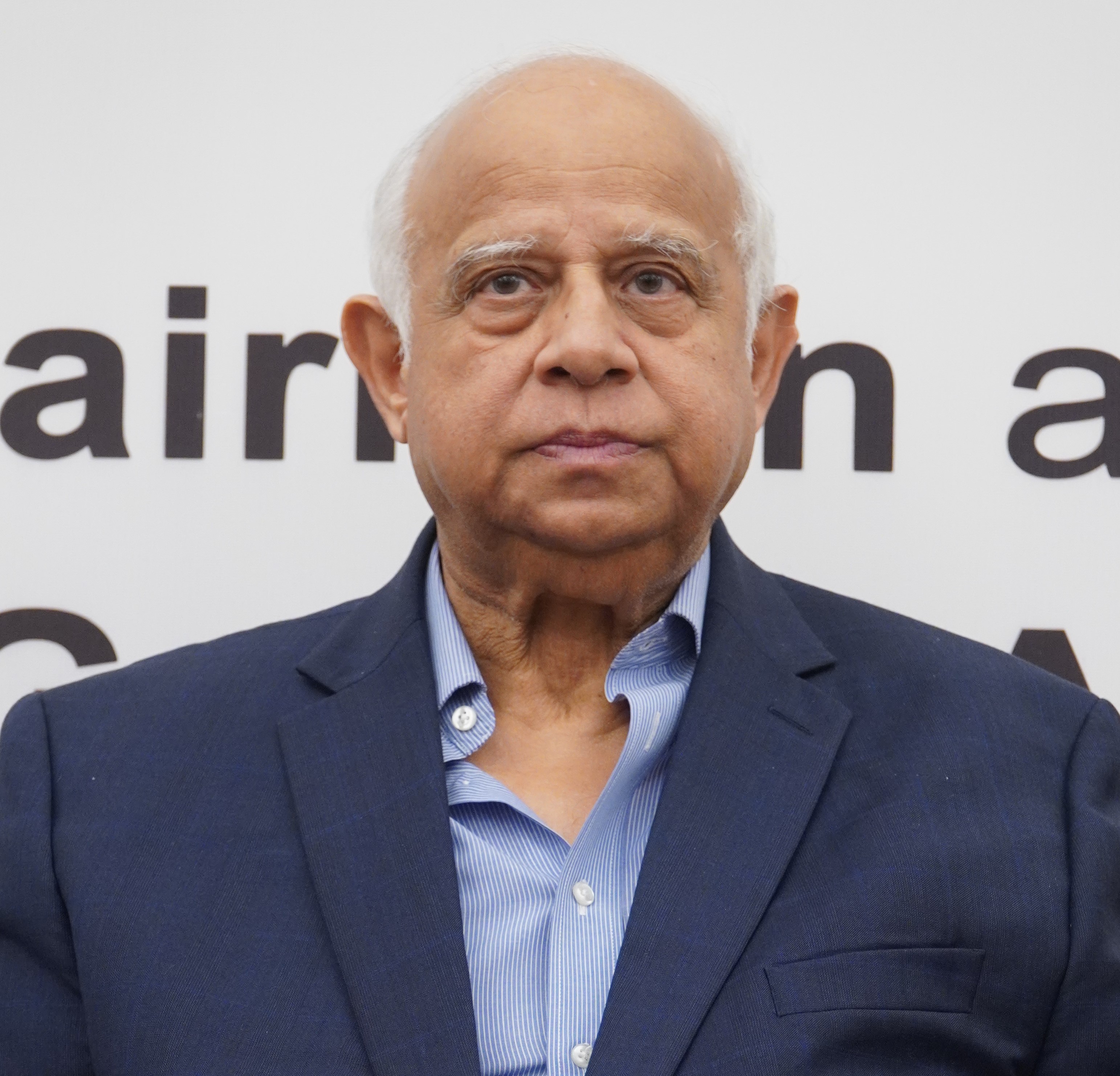
Mr. Ikram Sehgal, Chairman Pathfinder Group: First of all, we must thank Allah that he brought us here. I would then like to thank our guards, our employees, Aam Aadmi, this is their hardwork of 35 years that we are standing here today. Whether it be SMS or Wackenhut, they have made this possible. Thank you so much. Ali Shah is not here today, he and I used to sit. Our closest advisor was Aziz Penwala, he used to say this would not work but later he came around and said yes, this can happen. Ali Shah is in the US, he will return soon, but his team in iPath; please stand up, this young team has done this job. Thank you. Then VRG, and i3Pathfinder, we ran across some problems but Tasawwar managed them. I also acknowledge Ali Gardezi who worked very hard for us. See, I have avoided working with the government in the past. There is this book by Ayn Rand called Atlas Shrugged which revolves around the theme of never working with or joining with the government. I had worked twice with the government, sold two sugar mills to Bangladesh; the money for which I never received. With a lot of consideration, I started working with the State Bank and I have been pleasantly surprised, because starting with Yaseen Anwar who is sitting here, ma’sha’Allah, he is the first one who said go ahead. And then somebody who is not here, Ashraf Wathra, his last conscious effort before he left for America, the last file he signed was our PSO-PSP. And then of course, Reza Baqir came, and Sima Kamil, I can only thank them. But most of all I would like to thank Samar Hasnain and his team, Noor Ahmed, Imad-uddin and of course Azmatullah. They have encouraged me so much, they knew how much we were hemorrhaging, because we have to pay salaries and other expenses. Every month, we used to spend 1.5 to 2 crores of the hard-earned money. We were ready 3 years ago but there was someone who filed a suit against us. After a year and a half, the judge ruled that he cannot be the defendant. Then we could not get the PM, the Governor was changed, so naturally there were some hurdles or this could have been done earlier. I recognize Ali Naseer and Amir Ibrahim, without them this would not have been possible. Many telcos created problems, they were also told that Jazz will be blacklisted for signing an agreement with us, but both of them stood their ground, particularly Ali Naseer and Amir Ibrahim, despite the fact that they acknowledged that we would be eating into their business. This is what happens when you think of serving a nation, you think about the institution instead of an individual or bottom-line profits.
It was also a pleasant surprise for me working with Pakistan Telecommunication Authority. General Azeem Bajwa is not here, his message was here. He and his people, like Dr. Sargana and Dr. Shehbaz, Brigadier Haider, and Amir Shehzad, they are the three-four people who really stood by us. They had a lot of problems from the other three Telco’s. They had an example of Jazz, an agreement from Jazz, which in reality got expired in three months, but they didn’t let us know it got expired and three years have passed.
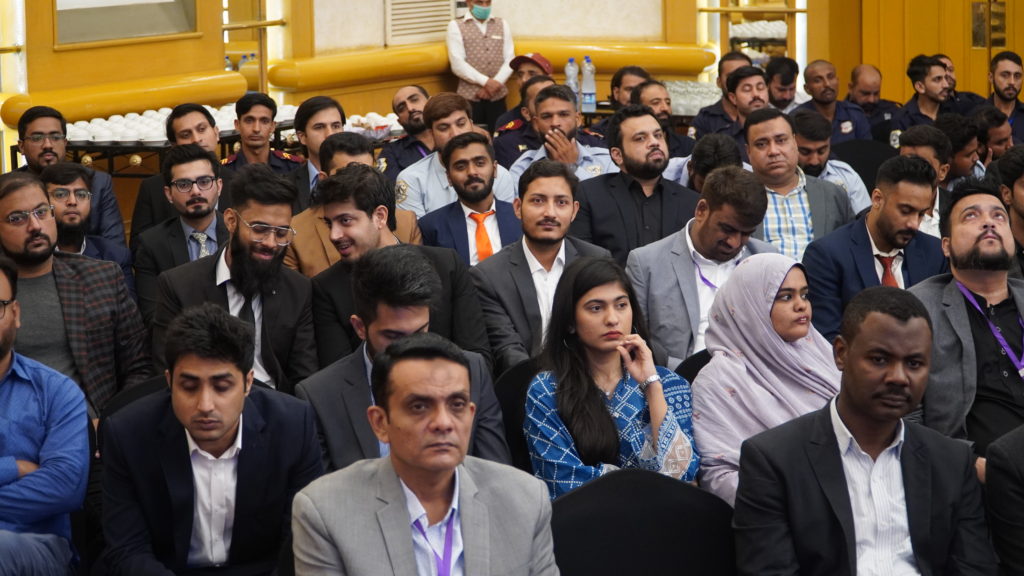
Then I would like to recognize my own family. Starting with Shehnaz, my wife, who of course said this will never work. (laughter) She is now convinced that it will. But she did encourage and she knew there was something good about it. Then Kashmala, my daughter in law, who before my son, became a believer, and said this will work. And then of course my daughter Nefer, who thought about this idea in the first place, she said Abu, why has this man got no bank account? What can we do to get him a bank account? She was the one who originally thought about it, so Nefer, good of you! And of course, I have to recognize Zarrar, what can I say, I will talk about him in the end. But definitely, unless you have your successor believing in what you’re doing, you can never do it.
Now, having said all that, I will also acknowledge the other Telcos, despite their reservations, Zong came through, Ufone came through and of course, Telenor on the last day, in the last hour came through, but they did. So, I thank them. I also want to thank the banks. There are 13 banks, we did not run into a problem even with a single of them. We got encouragement from the banks. Kabeer is sitting here, you all do not know, he has a fever today and he still came from Islamabad. Shahzad Dada could not stay as our event was scheduled for Friday but then the date got changed and he had to leave the country. I thank Shahzad Dada and UBL, of course, Jazz being first and UBL being second. Salman forgot to mention JS bank. JS has been a great supporter also. In fact, let me tell you a secret, the remittance of salaries, we started with JS Bank two years ago. In fact, in the areas which are inaccessible, in the sea, maritime security, FC, their salaries are being sent.
There are 160,000 agents, once this has been done ,you will be able to make transactions with any merchant without having to go to the bank. Reza talked about a couple of things that I agree with, it has been 10 days to the campaign and the awareness that should have been there has not happened yet. The awareness that Reza talked about is very important. The money is there, let us not waste that money. Advertisements need to be there, money has been spent for a good cause so let us utilize this opportunity. You very aptly pointed out about acquisition of merchants, Imad here has reached, he runs Fatafat, he is onboarding the merchants in a virtual amazon. We are going to be delivering pharmaceuticals, groceries and textiles. Because of that, they are at the moment onboarding the merchants. That is very correctly pointed out and we are doing that. I wish Shamshad Akhtar was here, he was one of the people we gave a briefing to, and he was very encouraging and I want to acknowledge that. Unfortunately, the thing she is heading now, Karandaaz, was most unhelpful to us. I introduced Bill Gates to Gen. Musharraf in 2003 in Davos. I could go to Bill Gates anytime directly, I never did. But, Karandaaz did not give us a penny. We kept on requesting them. They did give money for Raast, it is a wonderful idea, but it is the public sector. Some money should be given to the private sector as well. They kept delaying it and then projected some of our ideas as their own. So Karandaaz is not one of my favorite organizations at the moment. There are at least 8 to 10 startups in which Karandaaz has invested, which have failed. State Bank was telling them to invest but they did not.
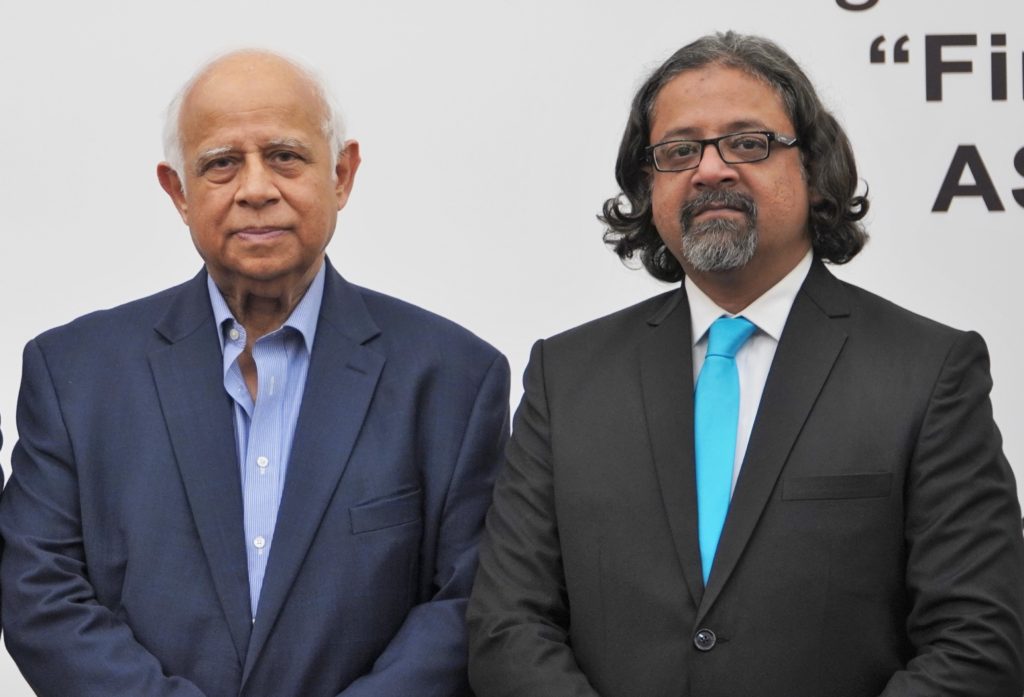
Salman talked about World Economic Forum; it sometimes saddens me that our worth is better recognized outside Pakistan than in our country. WEF, which is very selective, after our last presentation, they said that you are a lighthouse country. There are many one-to-one systems in the world, one telco with one bank, there is nothing in the world today which is many-to-many. This is unique. Pakistan is being considered to be a lighthouse country. You talked very aptly about Raast. The State Bank team recognized this and we are integrating. But what happened in integration, you went to the vendor, but they are not answering since two months, we are ready, we can integrate tomorrow morning. Raast is successful, but imagine, Sima talked about 50 million accounts, those accounts can get to 50 million only with integration. That way the financial inclusion will progress.
Why did this not happen, we have a feudal society. We want that Aam Aadmi, and with due respect, Aam Aurat, they should have a part of the financial pie. A feudal society will always try to keep common man from attaining that, so that he stays stuck in debt cycle. A maid in Islamabad was crying, I asked what happened and she said her husband is stuck with the interest on a loan of 10 thousand Rupees that they took when she was about to deliver a baby, and now they owed 200,000 Rupees to the same people, the man was working from morning till night but the debt kept on increasing. I sent some people, paid the amount and asked them to let the man free. He said how many will you save because there are so many people in a similar situation. This financial independence is necessary, awareness is necessary. Unless you create awareness, you will go nowhere.
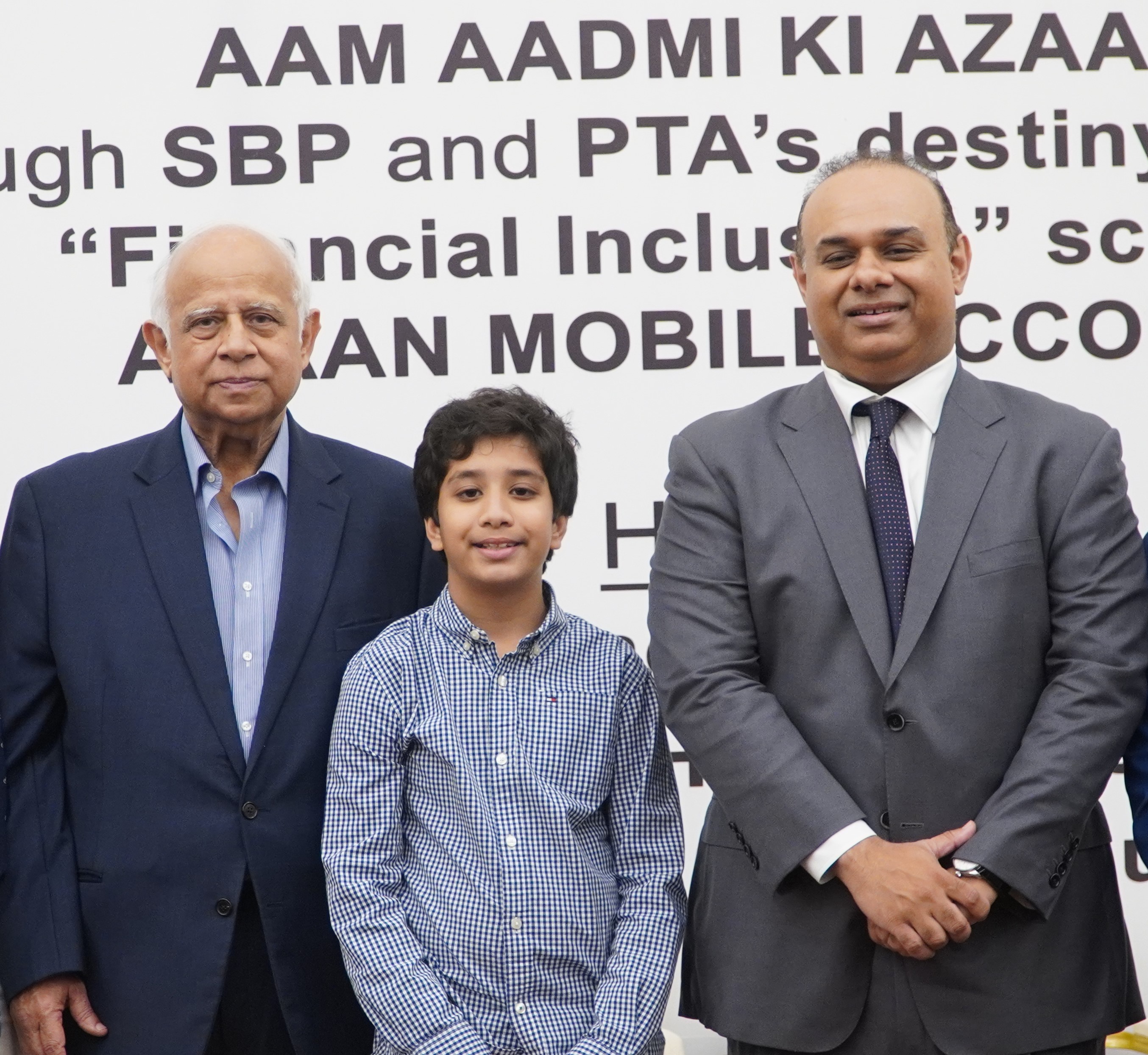
I would like to now turn to my family, and my three grandchildren who are here. I am so proud of them because two are doing exceptionally well in one of the finest schools in New York City. Amaani, ma’sha’Allah, she is breaking one of the taboos of the Sehgal family. We are never good at Mathematics. She has finally got an A in Mathematics. Elena is a star in her own right. You can’t walk down Park Avenue without every doorman passing by saying Hi Elena, how are you. She ran for class President, she won and the first thing she did was she offered her opponent to become a Joint President with her, and that is politics for you, 12 year old in New York. What I am really proud of is that today John McEnroe is coaching her for tennis. She is 12 and she is already ready to go into the big leagues. Well done, Elena. And of course, my Suleman. High point of my life is walking him to school in the morning, taking him to basketball, taking him to play squash, and then sitting down with him and discussing. He very patiently teaches me things that I do not know, for example games. I was thinking about succession and things like that and he brought me down to earth by saying something which you do not want to hear from a child but you want to hear from somebody. I was putting my medicine together the other day, he was looking very patiently and I said when I get older, will you pray for me, and he said no Dada you will be dead then. (laughter) he was right, he was absolutely blunt but correct, that is what you want in a successor so you do not live in a fantasy world.)
I would like to speak about my son, many years ago, my son graduated summa cum laude, with a distinction in Economics and a distinction in Political Science, in Boston University. He decided to do Law, I had my heart set out on him doing an MBA but Riaz Khan, the Dean of admissions in Boston University told me very patiently to listen to my son and support him in what he wants to do. So, I asked him, he said Law. He did very well in Law. Today, he’s recognized, from the last eight years, he’s on the 10 best lawyers in the United States on securitization or leasing of aircraft. He and his team are number one for the last six years constantly on the New York Times, whether you have the Legal 500, recognized as such. He could actually come back for a particular medical reason, and I am keeping him there. He’s all that I could have hoped for and more, besides, because I always get good counsel from him. But I am lucky because, obviously his vision is far more than mine and his vision, of course, of a bank, of other things that he wants to do is far more than mine. And I’m sure, like I told him that, my father provided me a platform of education and toughness, he took me to tough schools. Now for me it is all good, I am content with everything. I joined the army; we were sent to war for two years. We couldn’t complete our degree officially either. After 20 years when one of my course mate went to PMA as commandant, he asked them for our degree certificates. That’s when we got our college degrees. When we had a nine-mile run, on the eighth mile there was a mosque named Ilyasi Masjid, the water there used to be really cold, so whenever someone asked where we got our degrees from, we used to say we got them having water from Ilyasi Masjid. So that’s the thing about PMA, when you come back from the army you don’t know much. I used to think LC (Letter of Credit) was a lady. I only knew this much about banking or finance. But God has bestowed me with so much that I am content today. The biggest reasons for my contentment are sitting here, one; my employees and second; my family. My employees are like my family.
I want to thank you Reza for being here, Sima Kamil, Huma for being such a nice compere always. Thank you. And of course, Kabeer, I’ve already thanked you. Ali Naseer, Salman I want to acknowledge all the good work you’ve done, and the team that you’ve built up. Ma’sha’Allah we can say with conviction, in the IT industry, that we’ve got the least turnover of any team and we have also rewarded them, by taking them to Davos. People who went to Davos please stand up. These and other ones as well went to Davos, they also went through Europe. I had Faisal accompany them. Thank you all for coming. We all wish the most for contentment and I am a content person, and I thank you all for it. While I was speaking, we crossed a landmark today, 4.5 million accounts, we just crossed it. We had about two thousand less accounts when we started, so that’s quite a figure. Thank you.


